Reports from the Underground: Albums We Missed in 2021
Hello viewers of The Progressive Subway! I bet you all have been wondering where we’ve been this last month. Well, don’t worry those beautiful minds of yours; we’ve been at the factory, grinding out all of the uncut gems of 2021 to end off the year strong. I wish to present you all with 20 interesting albums that we could not get to during our previous rotation around the solar system’s local star. I have listened to every one of these albums at least a little bit and all of them sound fairly interesting (of course, some more than others!) but there is a ton of value here. I hope all of you look carefully through this list for what you think would fit your music needs.
I want to personally thank all of my music reviewing staff for the excellent work they’ve given into getting these albums dissected and recognized. Especially for the new recruits from September, Mathis, Will, and Zach have really proven themselves as fantastic editions of the team, and honestly, we’d be pretty screwed without them. It would essentially just be me, Sam, and Dan reviewing albums.
I have more important news! If you are interested in general “Album of the Year” material, stay tuned for our next post which will cover the best underground progressive metal, and prog metal-related, releases of 2021. This should be out within a couple of weeks. Afterward, we will be getting back to your regularly scheduled program of weekly underground prog releases. Thank you all for joining us, and happy reading.
– Sebastian
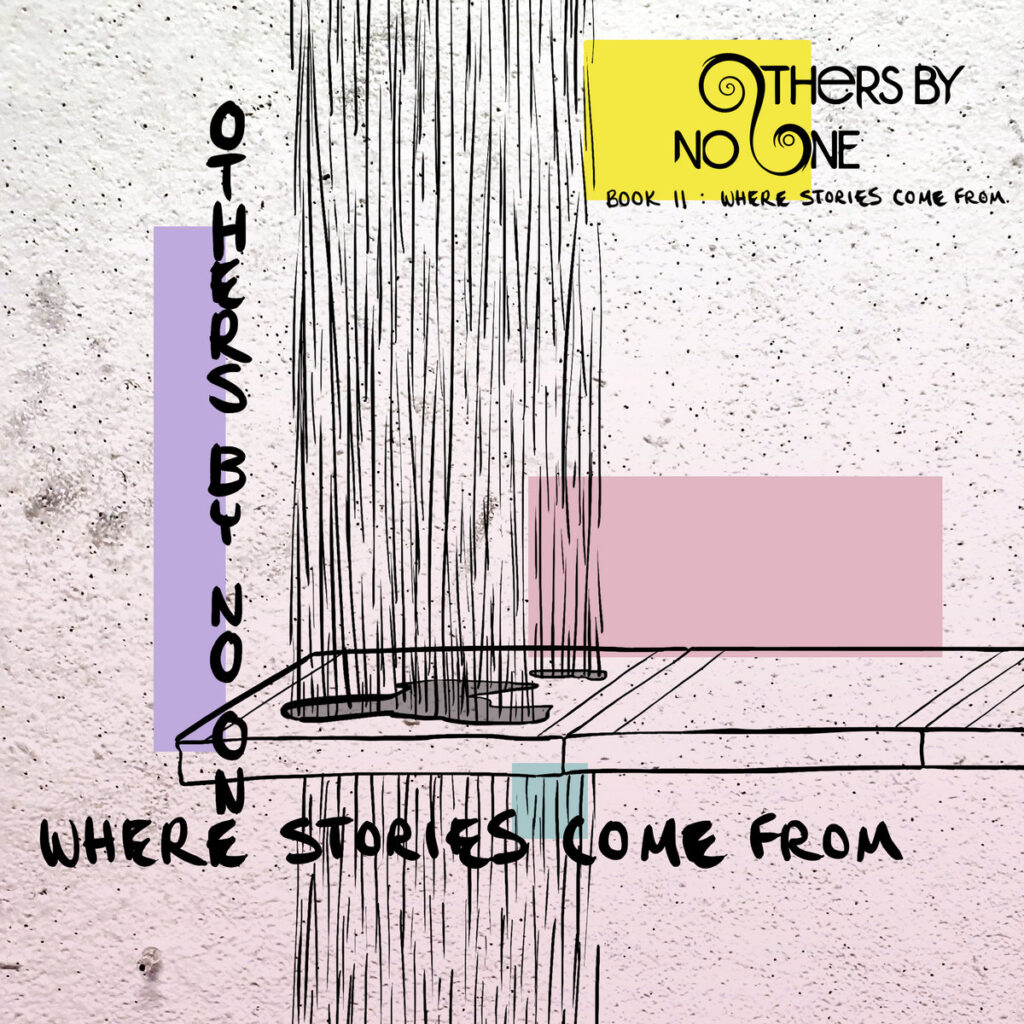
Others By No One – Book II: Where Stories Come From (US-OH)
Style: Prog Metal, Rock Opera, Avant-Garde Metal (mixed vocals)
Pick by: Sebastian
It seems that every couple of years we get a completely bat-shit insane album out of prog or avant garde metal that teeters on the brink of musical brilliance and over-the-top, incomprehensible chaos. People will usually either hate or love these albums. Even though progressive and avant garde metal have an implicit purpose to subvert the listener’s expectations, there is a thin line between how much a piece of music can subvert expectations without spilling over the edge into musical clutter. This is the kind of stuff that becomes more and more difficult to resonate with unless one puts effort into repeated listens and/or research into the lyrical content. This might be why this album was picked up and dropped weeks later by two of the members from TheProgressiveSubway; this album is marvelous and perplexing, it hits high peaks but is overall somewhat head-scratching. And to this day, I still do not have a firm, stalwart opinion of this album but here are some of my thoughts on Book II: Where Stories Come From.
I think Others By No One can be associated with the lineage of zany prog artists that came out after Between the Buried and Me’s The Parallax II: Future Sequence; these would be Native Construct, The World is Quiet Here, Edge of Reality, and now Others By No One (we might also be able to fit Rototypical into this bunch). I list these artists out not only because all of them are decently influenced by The Parallax II, but because they follow its footsteps in the spirit of making extremely progressive, wacky, and campy concept albums taking “prog” to the next level. Essentially, they take everything that Anthony Fantano hated about The Parallax II and dialed them up. This makes for a product that any reasonable person cannot expect one to fully appreciate on the first few listens. It essentially combines influences from artists across the board, from Pink Floyd to Sikth and everywhere in between.
Book II: Where Stories Come From is essentially a rock opera with scattered avant garde/progressive metal interludes. It follows a concept album about an author of fictional stories getting overly involved with the characters in his written creation and falling in love with one of the written beings. Because this is a match of unlikely individuals, a small misadventure ensues with the characters in the story. I’m not entirely sure but this might be meant to be a kind of theological allegory. Furthermore, there are more than plenty of effective existential lyrics in this album that remind me of something that Devin Townsend might write.
Speaking of Devin Townsend, he is one of this album’s major influences not just in the lyrical writing but in the vocal songwriting. In general, the vocals in this album usually sound very practiced, polished, and Devin Townsend inspired. They are performed mainly by Max Mobarry who has mad musical talent, along with a gang of 14 other vocalists that help do the main choruses and the various characters in the plot. This album in general is very vocal-centric and would suffer greatly without them. They propel the album’s climactic peaks which are usually in the form of triumphant choruses, for example, in the middle of “A Reverie to Quell the Giants” or the end of “The Plight of Proxy”.
Vocals aside, this album has a stacked lineup of instruments featured; we’ve got a flute, cello, violin, mandolin, 6 and 12 stringed guitars, upright bass, and I kid you not, a kazoo performance. Hearing a kazoo solo in a metal album is definitely a first for me. This album additionally has a broad range of musical styles which span from stuff that sounds like indie-folk, jazz-fusion, progressive rock, SikTh-esque djenty breakdowns, and death metal vocals. This album excels in delivering a variety of sounds that make it almost comparable to that of Empath.
However, I do want to touch on a couple of contentions that I have with Others By No One. One is that the songwriters can get a little bit too involved in the lyrics and concept of the album that it can weaken the quality of the melodies and musical effectiveness. For instance, when I compare this to something like Metropolis Part 2: Scenes From a Memory (MP2), I see that Dream Theater gets just about as into the concept of their album with all of their sex scene, car radio, and murder interludes, however in MP2, Dream Theater made sure to write award-winning melodies and intense musical moments in basically every song, scattered indiscriminately throughout the album to keep hold of the listener’s attention span. In comparison, Book II starts out incredibly strong with the first 4 songs then it starts to meander around a little bit afterward in the middle; I doubt there will be many people who say “Foxjune”, “Tomes” or “Tombs” are their favorite tracks. The album picks up again around the last few songs but it is incredibly difficult for a new listener to stay focused and get through this whole 74-minute whale in one sitting.
And this is less of a criticism as it is a personal preference but when I hear this band advertised as “FFO: BTBAM”, I expect this to be more metal. I’m definitely fine with this album being categorized as a big fusion of genres but I would not consider this a metal album at its core. I hate to become something like the very elitists that block my reviews from Metal-Archives but I want more metal riffs out of this band. The style of Book II is more akin to The Dear Hunter or Pink Floyd than a metal album. Additionally, when the metal moments are present, they do not have much build-up, they often just pop out of nowhere then leave, like the album has AHDH. This contributes to a common criticism this album receives, that it severely lacks cohesion and overall unity.
Because this is a lot more of a preference, my score is not negatively affected by the fact that I wish it were more metal. I know how hard it is for an artist to please everyone and I don’t want to be a thorn in their back for producing a, for the most part, stellar album. I know there are a ton of people out there that would absolutely love Others By No One if they knew the band existed. So, for all of you out there that like progressive, wacky, bouncing-off-the-wall, rock opera, concept albums with a smattering of extreme metal interludes this is something that is right up your alley.
Recommended tracks: A Reverie to Quell the Giants, Right Side of the Brain
Recommended for fans of: Devin Townsend, Native Construct, Pink Floyd, SikTh, Between the Buried and Me
You may also like: Edge of Reality, Artificial Silence, The World is Quiet Here
Related links: Bandcamp | Spotify | YouTube | Facebook | Instagram | Twitter
Final Verdict: 8.5/10

Acrylazea – A Cavalcade of Cosmic Calamity (US-NY)
Style: Avant-Garde Progressive Metal (mixed vocals)
Pick by: Zach
There are two types of avant-garde metal. The first one is a complete dissonant clusterfuck of musicianship where nothing is discernible and the guitars and drums might as well be playing different songs. “But it’s jazz-influenced, bro!” No, it sounds like my speakers are killing themselves. So I’m always a little wary whenever I see avant-garde in a genre tag. Am I gonna get the sounds of a studio rolling down a hill with all the musicians inside, or am I going to get something fun, enjoyable, and something that doesn’t take itself 100% seriously?
Oh thank fucking god it’s the second one. This is the kind of avant-garde I want. The symphonic, silly, obviously UneXpect influenced avant-garde. The moment the chorus of ‘The Terrible Tale of Dr. Heinzlmensch’ hit, I knew I’d struck gold. A song reminiscent of the avant-garde greats Sigh, it’s catchy enough to not scare people off from the later weirdness this album has to offer. But not weird enough to make it sound like seven different songs had an orgy. ‘Complex Delirium’ is just about the closest this album will get to power metal, with insane double-stop riffs and an outstanding vocoder-drenched chorus. And just as you think they’re going a little too straightforward for an avant-garde album, they slap a nice ambient section at the end.
From here on out, the album swaps between songs and segway tracks until the end. Usually, anything besides one intro and one segway would bother me immensely (cough, cough, Cynic). But like everything on this album, they’re just too damn fun to ignore. They’re almost necessary to bleed into the next song. ‘We, Visitors’ just loses some of the impact without that Middle-Eastern inspired interlude on ‘Beneath the Sands of the Cosmic Beach’. And how can you not love an album with a baroque-breakcore inspired interlude called ‘Ichorrr’?
‘Antithesis Syndrome’ veers straight into Vulture Industries territory with Vaudevillian vocals. And the band turns up the silliness to 11 with ‘Dead Charades and Masquerades’, a song that turns the black metal back on and adds an accordion to the mix. Y’know, for avant-garde reasons! That honestly makes it sound forced, but a lot of the unconventional instrumentation adds so much to this album.
But, ‘Ad Aeternus’ is where this album solidified itself in my top 5 for the year. Acrylazea gets damn serious on this last track. Starting with a typical clean proggy start only to move into the most beautiful passage of the album. The vocals are at their most theatrical, the guitar work is stellar, and the drumming is at its most frantic. A serious contender for SOTY.
However amazing A Cavalcade of Cosmic Calamity is (and trust me, it is), it is not without one glaring flaw. The interlude-song-interlude trade off could be annoying to some, and it really lessens the impact of each song that comes before an interlude. But honestly, I could say the same about so many of these prog albums.
Recommended tracks: The Terrible Tale of Dr. Heinzlmensch, Complex Delirium, Ship of Fools, Dead Charades and Masquerades, Ad Aeternus
Recommended for fans of: UneXpect, Solefald, Arcturus, Sigh, Akphaezya
You may also like: öOoOoOoOoOo, Phonopaths, Vulture Industries, Exxperior
Related links: Bandcamp | Spotify | Facebook | Metal-Archives page
Final Verdict: 9/10
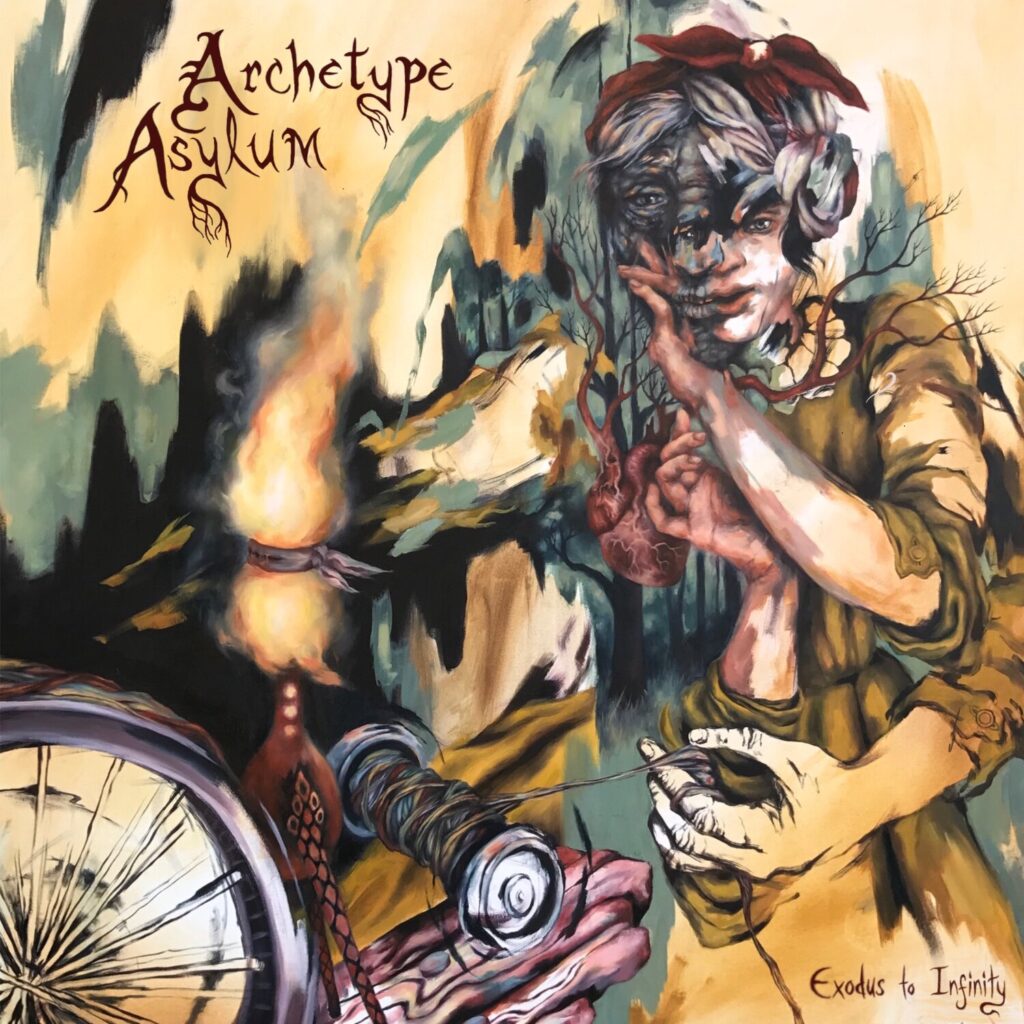
Exodus to Infinity – Archetype Asylum (US-MI)
Style: Whack Prog Rock (clean vocals)
Pick by: Sam
“Whack” may not be a recognized genre tag, but sometimes I come across bands that make me feel like this is unjust. Exodus to Infinity is one of those bands. Sure there is “avant-garde” and “experimental”, but both of those tags have much more serious connotations. Yes, “whack” is wild and eclectic, but it primarily is fun. Archetype Asylum is a record that makes me wanna dance as much as it makes me want to hug a seal at the zoo because life is good (oddly specific much?). This record goes all over the place, so put on your seatbelt, and prepare for the ride.
Just take the opener “King Other” for instance. It starts as a klezmer song at 110% hyperactivity with some country-sounding acoustics thrown in the verses, only for it to go full Mr. Bungle in the bridge with weird noises, and eventually end up as a heartfelt AOR-type power ballad. The song makes no sense on paper but they absolutely pull it off. Then “Shadow Self” at first sounds like a homage to Pain of Salvation’s Scarsick (both the album and the song) as they start copying Daniel’s flow of all things (which on paper again sounds like a terrible idea but they make it work, somehow), but it turns into this wild, funky ride with crazy prog mastery, again only to somehow end up at a heartfelt “candles out” type ending. This album is an absolute masterclass in genre-bending.
And it’s not like the fundamentals of this band are lacking either, which considering the fact that this is a solo project by a bloke called Danny Mulligan, is absolutely insane. From instrumentals, to vocals, to songwriting, to mixing, it’s all so well done. In my opinion, no one person should legally be allowed to be this talented. It makes the rest of us look bad. I would say his singing could use some more work (it’s serviceable but not amazing yet), but clearly, there’s a lot of talent in there. His versatility is (unsurprisingly) his biggest strength. He generally sits in a mid-range with a post-hardcore-type timbre and delivery, but can also do very soulful singing in the softer sections and go for some really high notes if he feels like it when it’s more intense. His power could use some work though, and sometimes his theatrics can go a bit too far into the cheese and break the suspension of disbelief. The core sound of the band is comfortably classic prog despite the whacky exterior. Each song is full of neat time signature fuckery and other wizardry like shreddy solos and intricate melodies. There’s also some classic metal influences noticeable in the drumming and some of the guitar work (primarily Iron Maiden I suspect). These fundamentals work well to ground all the whack that dominates the record.
Speaking of whack, we’re not done yet. The piano playing is super jazzy, and there’s a ton of funky rhythms in the record as well, making it super groovy. “The Body (…)” breaks into a mixture of soul and reggae in the bridge, and “Right Now” is a sudden disco song that I could swear was a cover of an 80s hit single because of how well it’s done. I swear it gives Michael Jackson’s best songs a run for their money. It’s easily one of my top songs of 2021. The final song “Second Innocence” is a solid closing epic that’s surprisingly consistent in terms of genres as it’s the most faithful prog rock song of the album. It feels like a summary of everything that this album has done so far, putting in nods to all the genres covered, but giving a more serious spin on it to remind you that they can still touch you on a deeper emotional level as well. It struggles in a couple of sections, but it’s a great song nonetheless.
Overall, Archetype Asylum is one of my favorite things I’ve heard this year. And it came out in January! It keeps surprising me how we miss things like this. I generally look for more serious music, and this was a lovely breath of fresh air for me. Usually whacky things lose me because they feel whack for the sake of it, but this band did a great job in grounding their eclecticism. Some improvements could be made in the vocal department and the more serious aspects, otherwise this is a fantastic record I highly recommend anyone who likes fun things to check out.
Recommended tracks: King Other, The Body (…), Right Now
Recommended for fans of: Native Construct, whack Pain of Salvation, Cardiacs, Mr. Bungle, fun things in general
You May Also Like: Others by No One, Vladimir Bozar, Troldhaugen, 6:33
Related links: Spotify | Official Website | YouTube | Facebook | Instagram
Final Verdict: 8.5/10

Rototypical – Volume I: The Tactician (US-CA)
Style: Whack Prog Metal (mixed vocals)
Pick by: Zach
Every now and then, there comes a debut album that just completely shakes up the balance of the prog community. And the biggest one to recent memory is the late, great Native Construct’s opus Quiet World. You just know an album is downright outstanding when it launches a thousand new bands all trying to capture that same sound. And boy, did that impact last. So many bands trying to balance the theatricality, storytelling, and BTBAM-worship, and so many of them fail to capture what made Quiet World so special. Only The World is Quiet Here seemed to make their style stick, but they’re one in a thousand at this point.
[Editor’s note: their bass player Tyler used to write for this blog. If you’re reading this Tyler, I still expect corny spoken word on album 2 :P]
Enter Rototypical. A young band releasing their ambitious debut just shy of 70 minutes. When you release an album that long, you’re either really sure of the music you created, or you just don’t know how to cut songs down. But, I’ve listened to (and liked) albums that are considered “overlong”, so this wasn’t anything new to me. Plus, the album art is pretty. What do I have to lose here?
‘Flint and Tinder’ sets the stage in rain, a soft humming gives way to an arpeggiated guitar riff. Immediately apparent is the theatrical opening accompanied by Pat Savage’s clean vocals. And then we’re treated to a quick legato freakout reminiscent of Protest the Hero. The riffs here are clearly BTBAM influenced, but somehow…catchier? Even between all the shreddy-ness, I could clearly define melodies and recurring passages through the first song. A lot more than I can say for most of these bands.
And unlike so many of these copycats, they give the listener time to breathe instead of having an endless onslaught of riff salad thrown the listener’s way. Instead of feeling like 12 riffs jammed together with a bass solo in the middle, there’s clear song structure here. Each song on this massive album flows into the other, with the obligatory short interlude before those monstrous two ending tracks. Speaking of monstrous, the “Honir” suite, nearly an EP in of itself, takes up a majority of this album. And “Honir” is where I realized something about this album that makes it truly special in my mind. The riffs are insanely technical, but Rototypical aren’t going crazy with switching it up every five seconds. They let their riffs develop a little bit, only changing them or going for a transitional passage just before they become tired.
“Girl of Gold” is this album’s breather track, precisely placed right after “Honir” to let the listener regulate their heartbeats. But “breather” is subjective because this track launches you straight into the 12 minute ‘Lunacy’ in spectacular fashion. And my god, this track has it all. Syncopation, jazzy melodies, dissonant chords, and a chuggy riff reminiscent of that one from Periphery’s ‘Reptile’. On its own, this track is an excellent showcase of how Rototypical build upon riffs and progressions.
And just when I was ready to say this album didn’t need another track to end it off, “Relic Glow” starts with a reprise of the main melody of “Perfecsion”, bringing the album full circle. Yes, sure, this is nearly 70 minutes long. But without this closer, the album would be incomplete. Could these two closers be trimmed just a tad? Sure. But as it stands right now, are they amazing songs to close out the album with? Hell yes.
If I have one thing to say to Rototypical for Volume II, it’s to let themselves experiment a bit more with their own style. They wear their influences on their sleeve, which is far from a bad thing. But I would love to hear something that sounds like them, rather than a combination of my favorites (and clearly their favorites). Either way, this record is truly fantastic, and I’d say Rototypical stuck the landing on this ambitious debut.
Recommended tracks: Cyclic: Bereft to Sodden, the entire Honir suite, Lunacy
Recommended for fans of: Between the Buried and Me, Native Construct, Protest the Hero, Haken riffs
You may also like: A Novelist, Cryptodira, Cyborg Octopus, Replacire, Chronicles
Related links: Bandcamp | Spotify | Official Website | Instagram
Final Verdict: 8.5/10
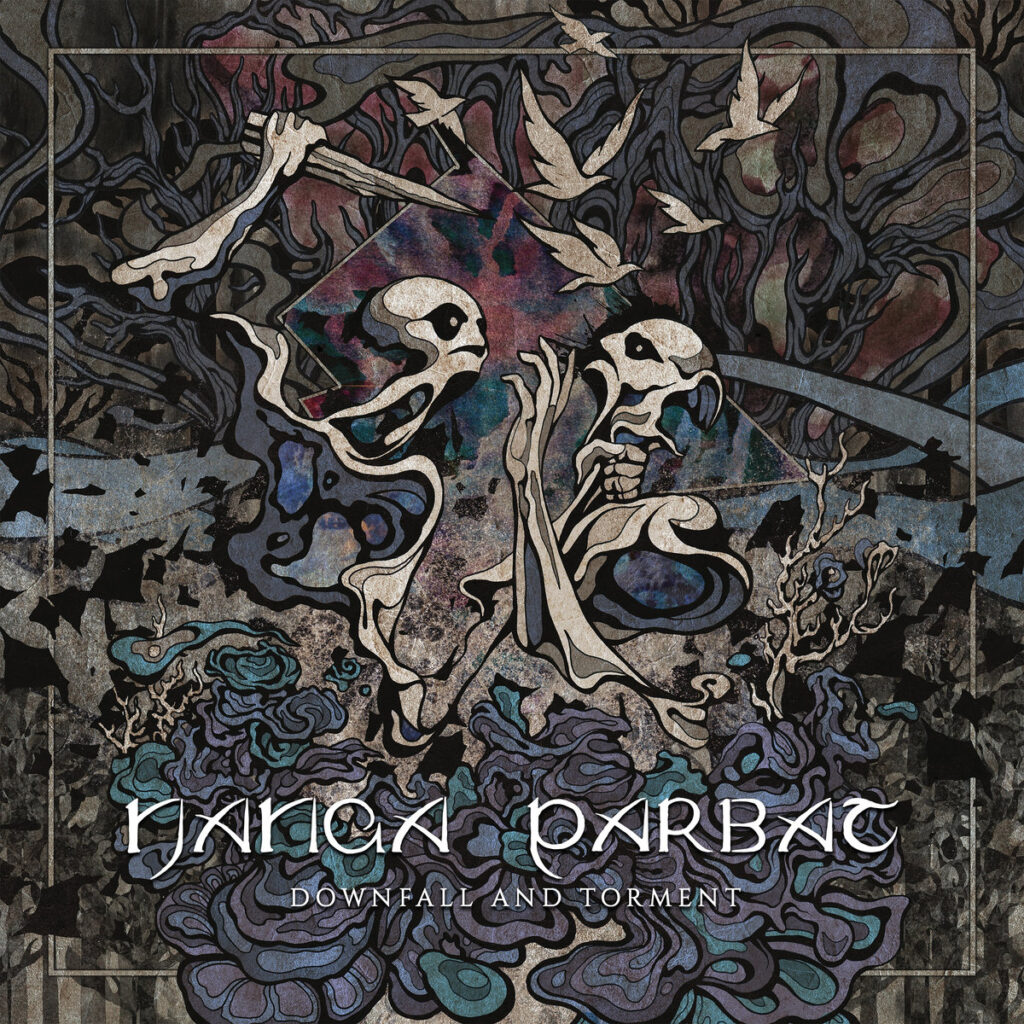
Nanga Parbat – Downfall and Torment (Italy)
Style: Prog Metal/Melodic Death Metal (mixed vocals)
Pick by: Will
Nanga Parbat is an Italian band that takes its name from one of the deadliest mountains in the world. While not the highest mountain in the world, “Death Mountain” claims the lives of 1 in every 5 people who dare to attempt its summit. Nanga Parbat’s debut album Downfall and Torment manages to put together the epic scale of mountains and the primal fury of nature.
The track opens with a beautiful instrumental, “The Edge of an Endless Waterfall” – which brings In Flames’ “Pallar Anders Visa” to mind – before the listener literally plunges into the savage, “Through a Lake of Damnation” which features what must be in the top ten of most epic-sounding guitar track fade-ins. From there, we’re off on a perilous journey with Nanga Parbat through beautiful but treacherous terrain, all under the haunting indifference nature holds towards human life. The album’s concept brings to mind stories of Biblical proportions – the Fall of Adam and Eve and their expulsion from Eden; Cain’s killing of Abel to name just a few.
The duality of harsh and clean, awe and terror is reflected in the instruments and vocals. The guitars move from clean arpeggios and melodic instrumentals to heavy death-metal fuelled riffs to reflect both power and beauty. The harsh vocals have a real, savage Amon Amarth energy to them on tracks like “Through a Lake of Damnation” but this is balanced by beautiful, clean vocals on “Blood Death and Silence” and with narrator-like The Vision Bleak style vocals on tracks like “Tidal Blight”. There are also some nice touches throughout the album such as choir music on tracks like “Demon in the Snow” which both add to the “epic” feel of the track, but also hint at the almost religious experience involved in being close to nature.
Though it is a challenge to bring together an album that seems to have duality at its core (the album art is of two beings locked in brutal combat) Nanga Parbat pulls it off in style thanks in no small part to the excellent musicianship from all its members. In particular, Giulio Galati’s drumming on this album is immense. From bone-rattling double bass to really forceful-feeling driving drumlines. You almost can’t help but visualize the drummer having a whale of a time, twirling his sticks while playing some of the slower lines that feel like a giant striding across the mountains. The downtuned and deadened drums give the tracks a more grounded, earthy feel to them – and some of his drumlines genuinely sound like an approaching avalanche as a result. This, coupled with Galati’s interesting technique in his solos, focusing on flow and melody rather than layering sound and rhythm gives the tracks a real sense of driving purpose. Even when the drums take a step back and work on some 4/4 beats, they really sell the sense of the band as a giant striding across mountains.
Though this is common in debut albums everywhere, there are some moments where the immersion of a song is broken by the band’s influences making a conspicuous appearance in some of the songs. “Tidal Blight”, for example, borrows a chord progression that unerringly drags my mind to Opeth’s “Godhead’s Lament”. There are moments in “Demon in the Snow” which are inescapably Symphony X and some of the clean, arpeggiated song intros sound very Blood Mountain Mastodon. But Nanga Parbat manages to bring enough to the table to keep the listener from wandering away to listen to other bands.
Downfall and Torment is an incredible first album by Nanga Parbat where the band is able to flex their ability to bring lofty concepts to life through engaging and hard-hitting music. In a climate that makes travel difficult for many around the world, this album offers an escape to treacherous mountain peaks. They’re certainly a band worth following as they develop more of their own style away from their many influences.
Recommended tracks: Through a Lake of Damnation, Blood Death and Silence
Recommended for fans of: In Flames, Symphony X, In Vain, Apocalyptica, In Mourning
You May Also Like: Descend, Toward the Throne
Related links: Bandcamp | Spotify | Official Website | YouTube | Facebook | Instagram | Metal-Archives-page
Final Verdict: 8/10
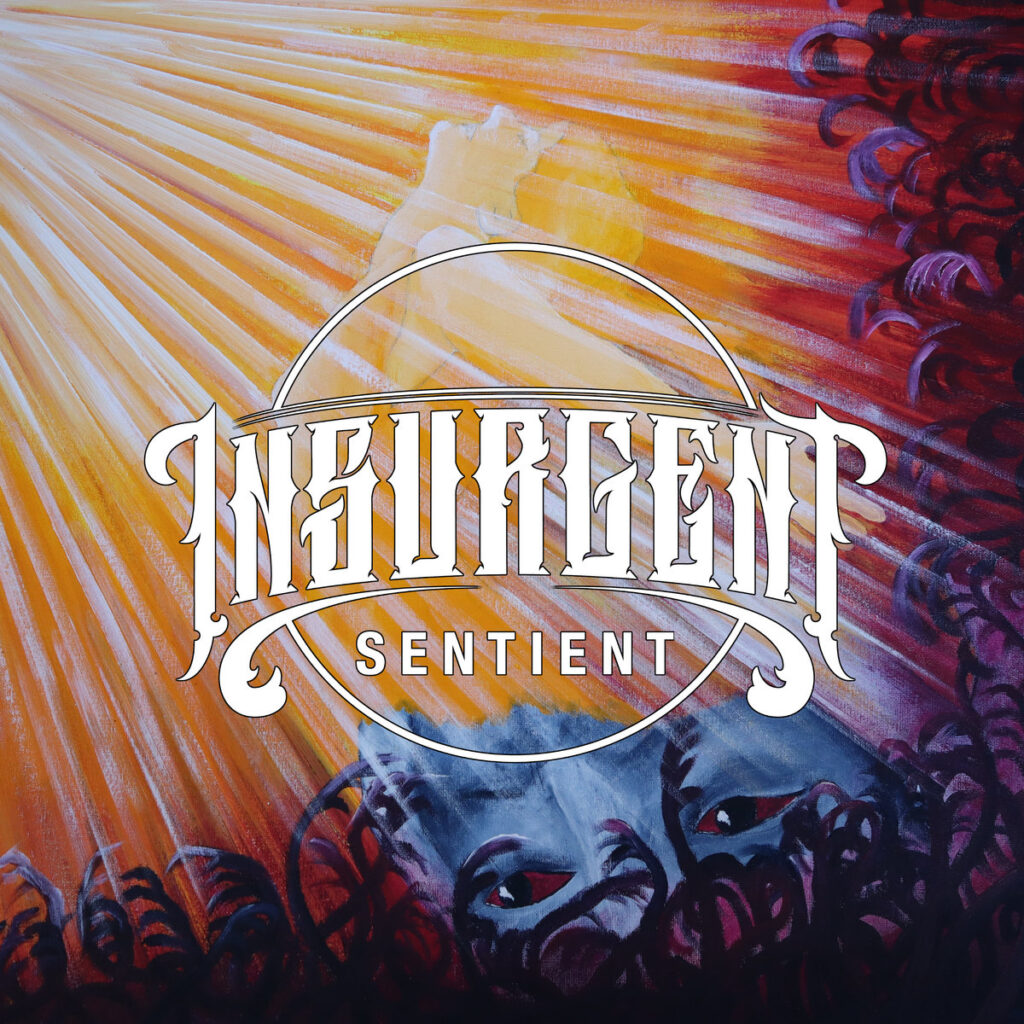
Insurgent – Sentient (UK)
Style: Prog Metal, Alt Metal, Djent (clean vocals)
Pick by: Sebastian
Even though prog metal has a reputation of being superfluously overcomplicated and musically overbearing, there is a strong subsection of the scene that focuses strictly on a melodic approach to the genre. Ironically, people who do not like prog metal very often complain that this songwriting focus on short and catchy songs is something that is absent in the genre. However, I think the most recent decade had its fair share of artists in this batch of ultra-melodic, often, djent-leaning prog metal. Some of the bands I think of immediately are Soen, Leprous, Haken, TesseracT, etc., and I would consider Insurgent to be partly influenced by this category of artists. Sentient is their debut EP from August of last year and it deserves a momentary inclusion in the prog spotlight.
The first thing that stands out on the album after the groovy down-tuned riffs are the polished, downright gorgeous female vocals. These are very skillfully performed by Katie Teitge who you can tell is an experienced vocalist. Her vocals deliver most of the great melodic hooks that Insurgent offers and is what the majority of the listeners will leave remembering. The combination of short catchy songs with female vocals, and djent-inspired guitar riffs remind me of Destiny Potato, but this is pretty different than Destiny Potato, it is more like what Evanescence would sound like if they were less depressing and were inspired by progressive alt-metal instead of alt-rock/nu-metal.
It is very hard choosing a favorite song out of the bunch in this EP mainly because they are all fairly consistent in quality. All follow a similar formula, built on catchy vocal hooks with one or two good riffs. Essentially all of the other instruments sound like they are written around the vocal lines rather than ever having their own time in the spotlight but they provide great rhythm and flavor to the songs nonetheless. One thing that I want to note is that the riffs in this album are indeed metal enough to get the band into Metal-Archives which is beyond surprising to me. I’m not complaining of course; we take the wins we can get as a community but MA usually avoids this kind of music like the plague.
To touch on what I believe is the band’s biggest weakness is that, while they are good at the formula that they have, they do not stray far from it in the slightest. I do get that this is an EP, so I can forgive the lack of progressive songwriting this time but in the future, I would like to see some longer and more experimental song structures. It would be cool to hear more moments where the other instrumentalists can have their time to shine with some strong builds, breakdowns, solos, or other experimental performances. This is a major aspect that does separate some of the bands I mentioned above from Insurgent. It would also be nice to get some more vocal variety with some grows or harsh screams but I think I might be asking for too much; like a spoiled kid sitting on a mall Santa’s lap.
Overall, for what they have, this is certainly a piece of art to be proud of. They have all of the relevant skills on how to craft an enjoyable auditory experience. I am not only including the performances, or the melodic songwriting, but also the technical aspects of sound engineering in this album. And I think that this band can only improve on everything from here, so I’m very optimistic for what the future holds for Insurgent. If any of this piques your interest, do check out this 22 minute EP.
Recommended tracks: Zero-Sum, Colours Bleed, Eclipse
Recommended for fans of: TesseracT, Destiny Potato, Spiritbox, Black Orchid Empire
You may also like: Persona, Chiasma, Seeking Tragedy
Related links: Bandcamp | Spotify | YouTube | Facebook | Instagram | Twitter | Metal-Archives page
Final Verdict: 7.5/10
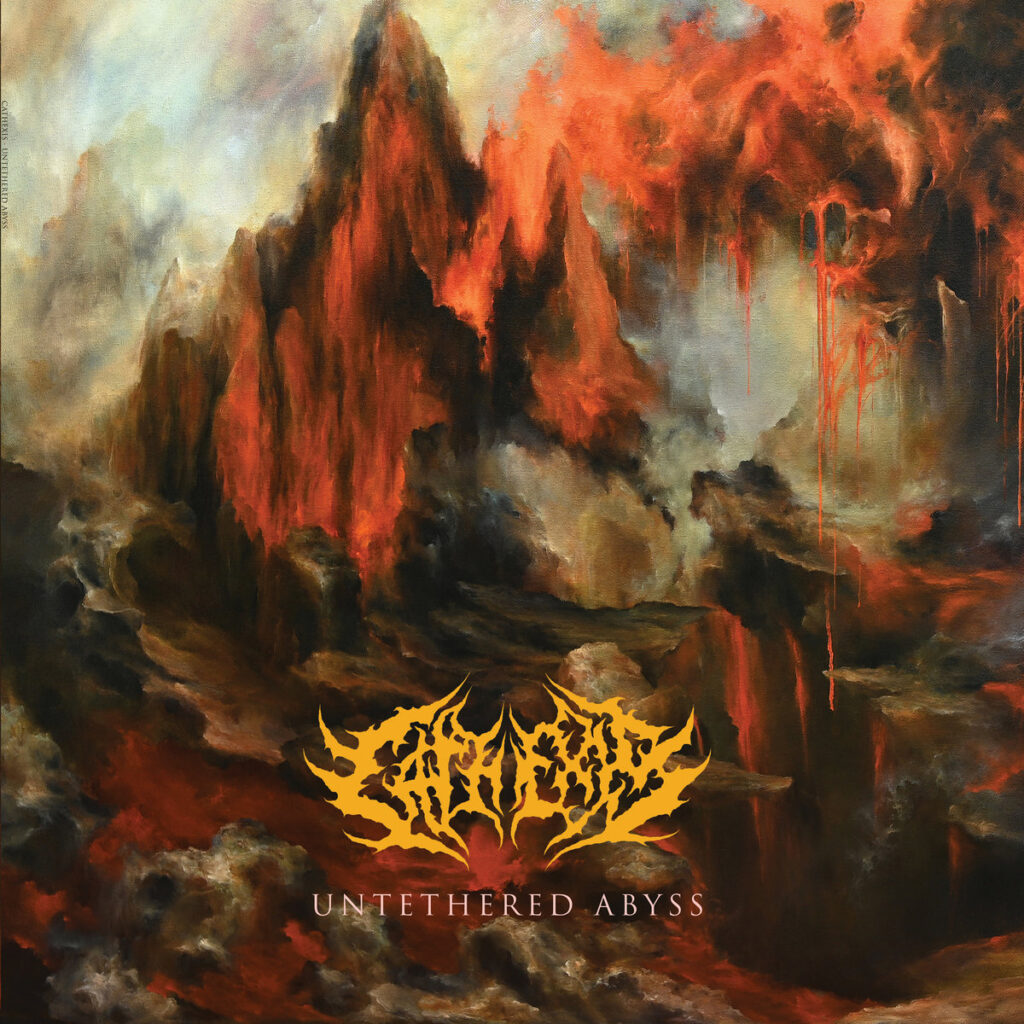
Cathexis – Untethered Abyss (US-TX)
Style: Technical / Dissonant Death Metal (harsh vocals)
Pick by: Dan
Dissonant death metal has exploded in popularity over the last few years, as atonal riffage and filthy production became lofty goals rather than musical taboos. This proliferation has been rewarding for those masochistic eardrums attuned to its particular frequencies, but has also left the musical battlefield awash in the blood of mediocrity. It’s often difficult to distinguish between the various groups writing similarly skronky riffs with low guttural vocals – beyond song-to-song familiarity, there’s not much to my ear that stylistically separates the bulk of these bands.
Cathexis, while not necessarily an exception to this, presents a particularly compelling and well-executed form of technical, razor-sharp, badass dissodeath on Untethered Abyss. The songwriting is labyrinthine but completely enrapturing, never content to rest on its inscrutable laurels, choosing instead to push the musical envelope just a bit further with each track. Bits of melody and a few skillful leads poke through the dense fog, tempo changes abound, and progressions frequently take sharp, unexpected turns.
When the riffs hit, they hit hard. The whole band embraces groove and foul, stompy swagger, as the audience’s collective upper lip curls a bit in disgust and heads start to nod. This is good shit, dragged from the fetid sewers and brought to fester in the sun. The growling bass is nice and clangy, brightening up the mix while also dramatically thickening it. The guitars intricately trade focus without losing track of each other or – more importantly – the song at hand. The drumming is lively and full of nuance despite the unrelenting intensity. There’s unprocessed life to all the performances that dramatically enhances the final product; video proof of these guys kicking just as much ass live confirms the honesty of the recordings.
While surely standing at the forefront of the crowd, Cathexis haven’t fully left it behind yet. The song arcs are thoughtful and focused, but there’s little dynamic variation over the course of the album’s 31 minutes so they tend to blend together a bit. These musicians have the chops to create big dynamic payoffs that are worth every second, so if they chose to embrace greater contrast in their writing, I could see them confidently pulling away from the pack.
Listeners who enjoy focused atmospheres of atonal intensity will find plenty of redeeming value in this five-piece’s excellent debut, but I don’t know if Untethered Abyss has accomplished anything quite unique enough to truly stand out and withstand the test of time.
Recommended tracks: Harrowing Manifestation, Library of Babel, Isolated Malevolence
Recommended for fans of: Gorguts, Anachronism, Ænigmatum, Blindfolded and Led to the Woods
You may also like: Sunless, Intonate, Noctambulist
Related links: Bandcamp | Spotify | Facebook | Instagram | Metal-Archives page
Final Verdict: 8/10
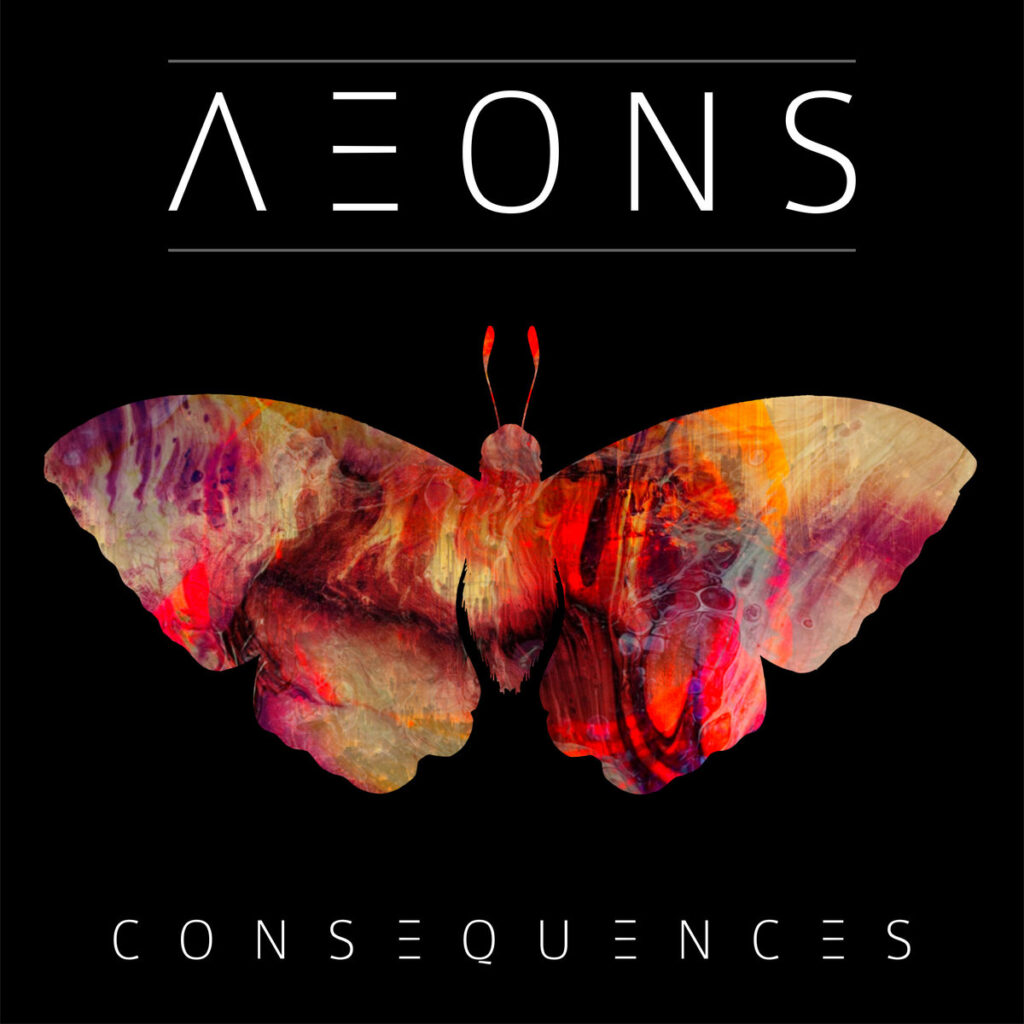
Aeons – Consequences (UK)
Style: Metalcore (mixed vocals)
Pick by: Dylan
Aeons is a returning band for us here, as their debut album A Tragic End was reviewed back in 2020 by me. While I remember having very few negatives to say about it, it sadly became part of a large list of albums I reviewed that while good… never really became a part of my rotation after I finished writing about said release. While this doesn’t necessarily mean that it was overrated by my standards, it does say something about how I had seemingly no interest to revisit thanks to its lack of freshness.
Their follow-up is hardly the Consequences of my review, as it seems that they’ve gone and put out an album that is quite similar to their debut, only with a downgrade in its virtues and a pronunciation in its defects. What once was an original blend of prog death/metalcore with some genre tropes done competently has become a shallow blend of prog death/metalcore with genre tropes well implemented.
Allow me to explain; this release can be separated into 3 types of songs. The straight core-prog song with verse/chorus/verse that comes with a harsh/clean/harsh structure to complement it, the Opeth-core fusion songs that offer a bit more depth in their songwriting with longer clean sections, and yet another Opeth influenced style that’s pretty much just ripping them off. The straight core-prog songs are serviceable mostly carried out by their catchy choruses to keep you distracted from somewhat generic verses. As far as the Opeth side of things goes, the rip-off is surprisingly the best song on the album. While I wouldn’t quite call it a 1 to 1 bastardization of them, it’s undeniable that “Blight” shares many aspects of “Death Whispered a Lullaby” from Damnation, yet it seems to build upon the fantastic song that it is, instead of half-assing a copy. I actually ended up liking the rip off more than the original, thanks to the better execution in its chorus.
Unfortunately, most of the album doesn’t rely on Damnation worship but rather traditional Opeth worship with a slice of metalcore. This recipe unfortunately falls in the serviceable but underwhelming category, with nothing to point as a significant flaw yet on the other hand very little to discuss positively. The instrumentation awkwardly tries to come up with a lot of riffs that aren’t too impressive (also present in the shorter tracks but at least avoidable in the choruses), the vocals are impressive but not enough to carry out the lengthy songs, the drumming is serviceable but will never blow your mind… It’s amazingly middle of the road. Unfortunately, thanks to the nature of their structure, these songs are also what carry out a large portion of the album, effectively pronouncing their flaws to the point of degrading the good/great stuff that comes in between them.
So essentially, the traditional Opeth worship became worse, the trope-y songs got slightly better, and we got a pretty great Damnation-esque song. I can’t in good faith recommend Consequences as a complete piece, but can’t also write it off in its entirety thanks to some pretty enjoyable tracks that unfortunately made up the minority of the album. Take my recommended songs and go!
Recommended tracks: Blight, Rubicon
Recommended for fans of: Opeth, Periphery, Born of Osiris, BEAR
You May Also Like: Arjuna’s Eye
Related links: Bandcamp | Spotify | Official Website | YouTube | Facebook | Instagram | Metal-Archives page
Final Verdict: 6/10
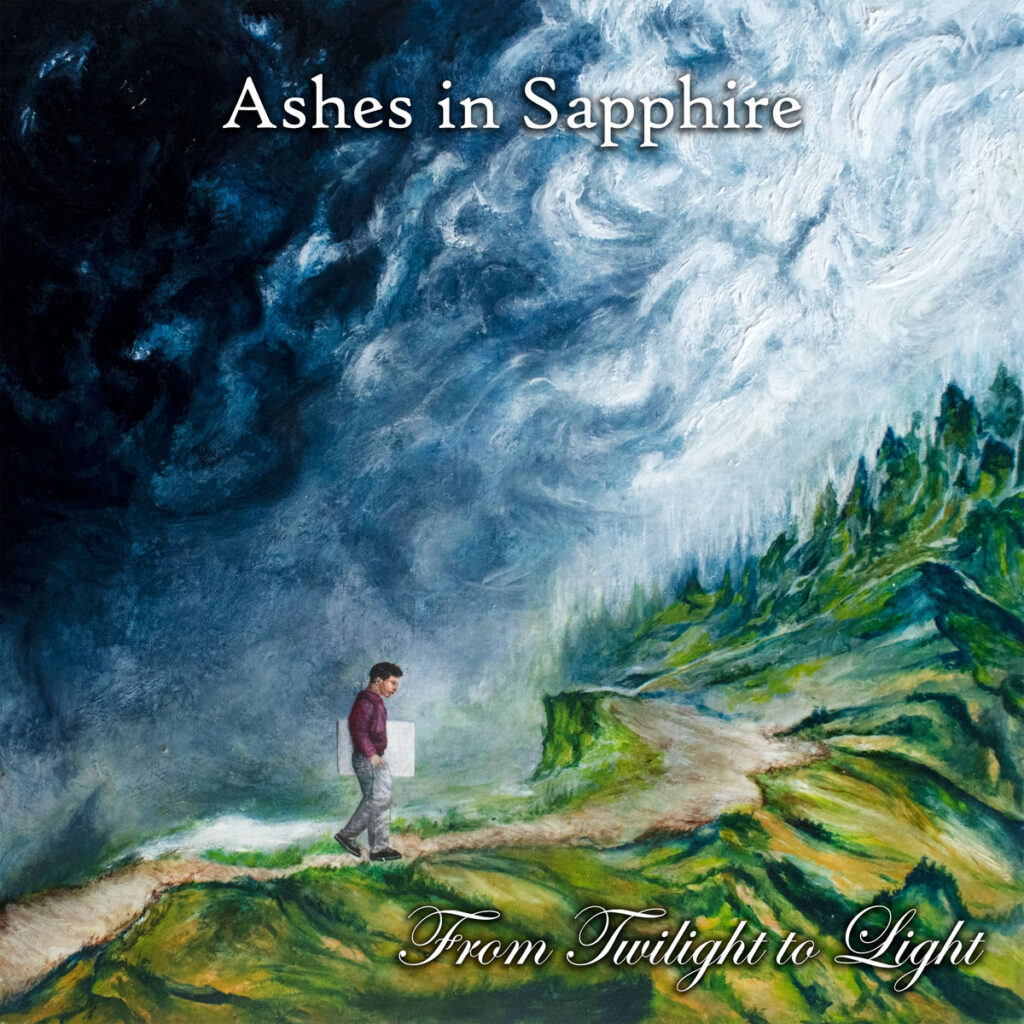
Ashes in Sapphire – From Twilight to Light (Venezuela)
Style: Symphonic Progressive Rock (clean vocals)
Pick by: Will
From a country that has seen more than its fair share of upheaval in recent years (not to mention a global pandemic), Cristhian Zambrano, departs his usual gig as keyboardist to symphonic metal band Aphelium to launch his solo project Ashes in Sapphire with the moody and deeply contemplative album From Twilight to Light.
From its album art depicting a lone figure traversing a swirling landscape, to the title choice of From Twilight to Light, we see that journeying is an ongoing theme throughout the album. Indeed, Zambrano has described the album as a journey for himself, teaching himself how to sing, play guitar, bass and to mix and produce in service of the project.
“Under the Rain” has one of the grooviest main riffs that I’ve heard in a long time and carefully deploys it throughout the song to leave you wanting more. “Symphony in Blue” (featuring guest artists Maria Trejo and Paula SantaCruz on strings and the beautiful vocal stylings of Micky Huijsmans for added texture) is a fantastic rock-opera-esque epic. “She Wasn’t Dreaming” demonstrates Ashes in Sapphire’s real flair for composition and production as well as giving Zambrano space to jam on the keys which is a genuine pleasure to listen to.
There’s an interesting gestalt quality on this album. Though, there’s nothing overly complicated or technical here but Zambrano turns this into an advantage: With little competition for space in the mix, all the instruments are free to do what they need to do to carry the melody forward and all the different components are given ample room and opportunity to shine. In a genre where there is a tendency to be technical for technicality’s sake, this is a refreshing album to listen to and shows how much you can achieve with comparatively little. This relative technical simplicity also lends a real sense of purposefulness to the songs. This is music that’s going places and doesn’t have time to linger on self-indulgent soloing.
The production is worth mentioning as well. It’s well-balanced and the multitude of elements that make up some of the tracks don’t feel like they are competing for space. Zambrano also makes some really effective use of reverb and doubling up as on tracks like ‘Equilibrium’ which vastly improves the song.
Impressive as it is that Zambrano learned new instruments and techniques in order to produce Twilight to Light, it is apparent on some of the tracks that Zambrano is on a learning curve. There’s also the issue of font choices on the album cover but that’s just me judging books by their cover and being a total font-snob!. His lack of experience as a vocalist shows and he struggles to hit some of the notes he has himself written. This is most apparent in tracks like ‘Equilibrium’ and especially ‘Symphony in Blue’ when heard next to Micky Huijsmans delicate, operatic guest vocals.
Ultimately, however, I found that this didn’t detract from the album as a whole but rather added to the intimate quality of it. There’s a real sense of an artist developing throughout the length of the album and in fact, this album could well be recommended to anyone who is trying to start their own artistic project. It stands as a testament to the fact that an artistic work can be deeply affecting without being perfect. Twilight to Light is Ashes in Sapphire’s first album. And, if it represents a learning curve on new instruments, then, wow, am I excited to hear what they come out with next.
Recommended tracks: Under the Rain, Symphony in Blue, She Wasn’t Dreaming
Recommended for fans of: Anathema, Ayreon, Lacuna Coil, Symphony X
You may also like: Moon Machine, Rope and Ladder, Gandalf’s Fist
Related links: Bandcamp | Spotify | YouTube | Facebook | Instagram
Final Verdict: 6/10
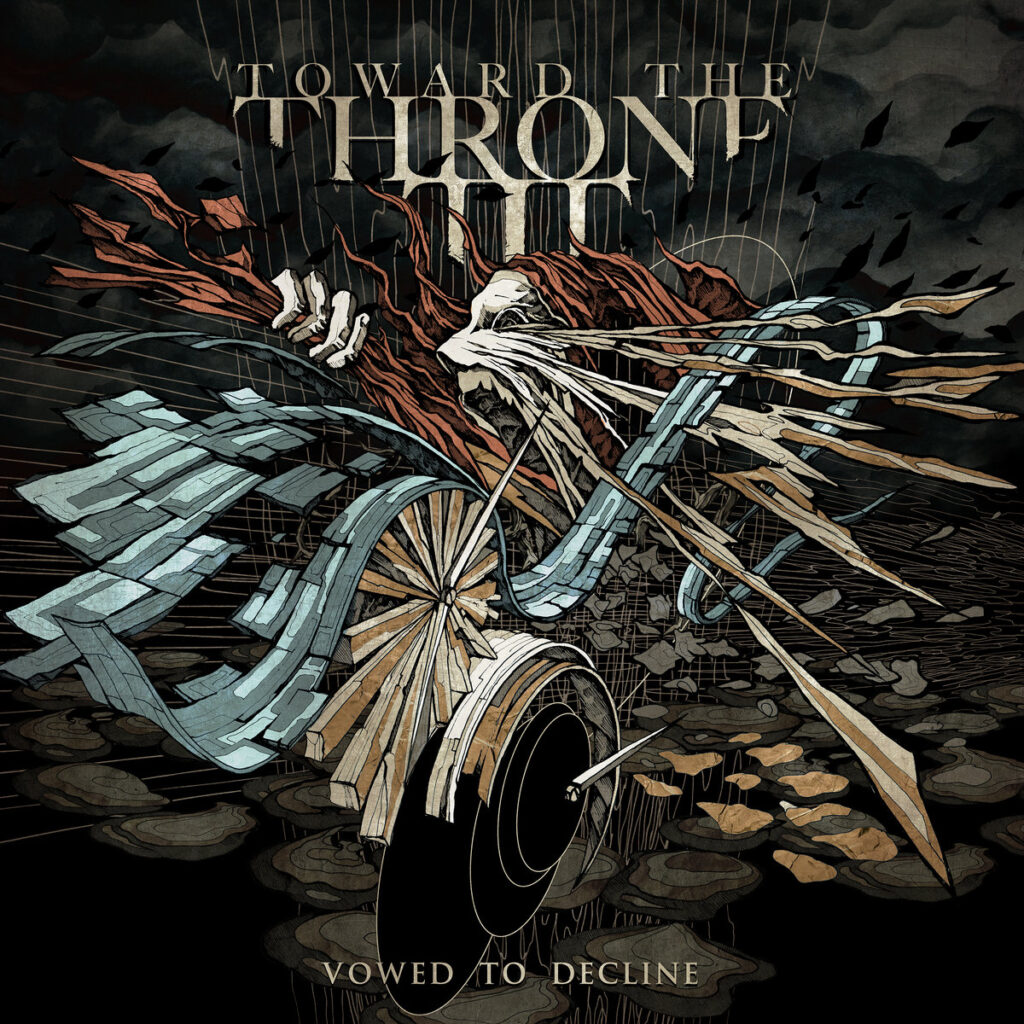
Toward the Throne – Vowed to Decline (France)
Style: Symphonic/Melodic Death Metal, Atmospheric Black Metal (mixed vocals)
Pick by: Sebastian
Before listening to Toward the Throne, I had not known that the genre labeled “atmospheric death metal” was a thing. When looking it up on LastFM.com the first bands I find are Septicflesh, Hypocrisy, and Nocturnus. Even though I can easily see the resemblances to Toward the Throne, I’m not too sure how much this label has picked up in death metal discussions, so I think it would be more telling to describe this band as a mixture of various shades of melodeath with a pinch of prog metal and atmospheric black metal. This band is atmospheric, but not in the way that one might immediately think of when talking about atmospheric extreme metal. It is atmospheric in the kind of way that Swallow the Sun might be with their long, melancholic riffs, or Septicflesh with their ominously cinematic symphonies.
Maybe it is just me personally, but when picking up albums to review from the underground scene, it’s a good sign to see a small back catalog. The more time a band releases albums and stays unheard-of, it raises unconscious questions as to why the band never picked up speed, why nobody has ever been talking about them. Of course, you’ll find cases where a band’s quality of work will pick up around their third or fourth release. But it often seems like the bands that we hold to be genre essentials were amazing right out of the gate with their debut album. Conversely, there are countless bands in the underground of Metal-Archives that are on their Xth album and still release material that sounds like it could be their debut, god forbid their demo. So, when choosing underground bands to follow, it is good to either see a small but quality back catalog, or one that shows a good trajectory of improvement. And I will say: Toward the Throne has both.
Quite a bit improved since Toward the Throne’s debut EP in 2017. Their songwriting showcases stronger and more numerous hooks, they got better at building up to a climax, and their overall instrumental layering and synergy improved a good bit. And their debut was pretty decent already. Their mix and mastering sound very good, and one can tell that it is professionally done. They got Victor Bullok (Dark Fortress, Trypticon, Noneuclid) to do the overall master which brings up the sound quality to something that could approximately be a mainstream death/black metal release.
Easily my favorite track on the album is “Still, Denial” which has pretty much everything I want from a band like Toward the Throne. It starts with an ominous acoustic opening riff, then breaks into double bass drums, soon followed by low, textured growls, and epic symphonic elements. Then we get one of my favorite riffs from this album, really sad and melodic, accompanied by lamenting gutturals and relentless drums. The last minute of this song is an orgasmic build-up of a resoundingly powerful symphony and a chugging rhythm section. It finishes off with one long final growl which transitions into a soft piano reprisal of the main riff.
Most of the other songs have a consistently decent level of songwriting, but I do not think they topped “Still, Denial” anywhere else. I’d like to see more of these epic build-ups with more progressive elements and reprisals. I loved that piano transition at the end. Generally speaking, the album becomes gradually more dissonant and atmospheric especially as it comes closer to the finally, with increasingly abrasive blastbeats, tremolo picking, and double bass drums. In my humble opinion, Toward the Throne are their best selves when they balance strong melodies with their crushing instrumental performances but some of that is lost in tracks 9 and 10.
A final criticism that I’ve had with Vowed to Decline is that while it has a lot of well-thought-out ideas, and has a consistently good level of both songwriting and audio mastering, a lot of this can sound a bit generic to me (more so tracks 1-3 and 8-10). It is weird, they have so many influences one can name from At the Gates, Enslaved, Der Weg Einer Freiheit, and even Rivers of Nihil, [see “Opposed (In Every Way)”], that it all melts into a blur of melodic extreme metal. It often feels like they took bits and pieces from a dozen different bands but rarely write material that sounds wholly different from what listeners might have heard before.
Overall, this is a pretty good album. Despite me not being sure if they have found their unique place in the scene, I keep coming back to this album and enjoy it the more I listen to it. This is good listening material for fans especially of melodic death metal and symphonic death metal.
Recommended tracks: Still, Denial, Ashes of Pain, The Sower of All Our Beings
Recommended for fans of: Enslaved, Septicflesh, Der Weg Einer Freiheit, At the Gates, Hypocrisy, In Mourning
You may also like: Ad Nemori, Dawn of Ouroboros, Summoner’s Circle
Related links: Bandcamp | Spotify | Official Website | YouTube | Facebook | Instagram | Metal-Archives page
Final Verdict: 7.5/10
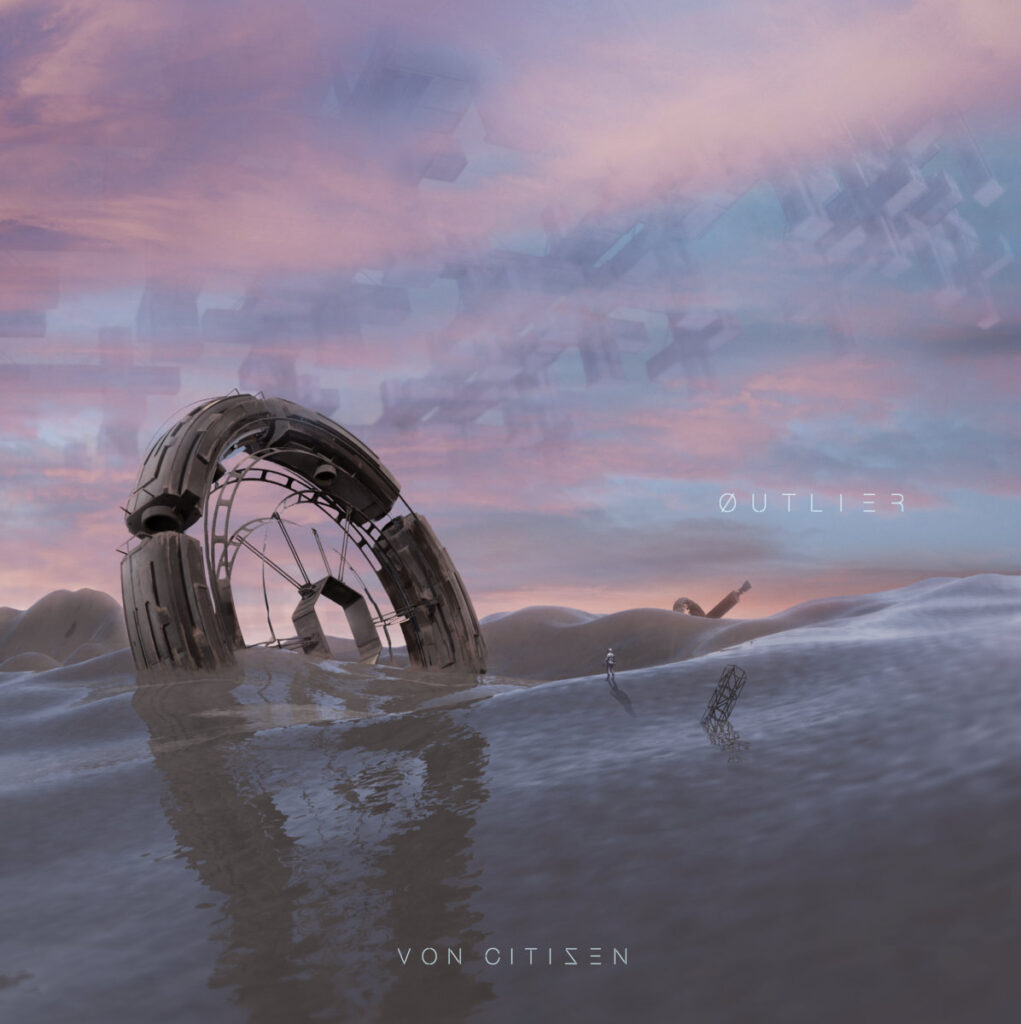
Von Citizen – Outlier (China)
Style: Jazz Fusion, Progressive Metal, Djent (Instrumental)
Pick by: Mathis
Although this is my first time covering this genre on the blog, I love me some instrumental jazz fusion. You can listen to it while falling asleep, working out, playing videogames, or just have it play in the background throughout the day. There is an incredible amount of variety in jazz fusion, yet most new acts these days are just Plini worship. However, Von Citizen decided to go for a more refreshing approach with Outlier and cover as many styles as possible in only seven tracks.
Don’t go getting all upset that this release doesn’t have ten to fifteen songs, or twenty minute epics. Outlier is the epitome of quality over quantity, and I am completely unbiased here in saying that I think anyone who enjoys instrumental fusion will find something they like in this album. The composition is great, the musicianship is great, and the production is great.
I am going to cover each song (briefly) in the order they appear on the album, and to kick that off is “Bliss”. What a great choice for the first track of the album, it begins with a slow synthy vaporwave vibe that suddenly fades out after a few seconds. Then the beautiful Arch Echo-esque melody kicks in, bringing my ears to audio ecstasy. It feels so freaking good, I get it, it sounds weird; it is just such a pleasurable bop of a tune. Honestly, at this point, I was happy knowing that Von Citizen were a clone of one of my favorite instrumental bands, but then two minutes in, things got techy. This is it ladies and gentlemen, now “Bliss” has become an Animals As Leaders song, and after about two minutes of djenty tech the song returns to the joyous melody from earlier in the track. I rate this track a 10/10. That’s some epic stuff.
Track two “Petrichor” sounds very Plini-like, but in the best way possible lightweight and gentle, but with the bounciness of something like Sithu Aye’s “Grand Order”. You get those glockenspiel “tings” here and there that both of the aforementioned artists are so fond of. This song has nearly no synth/keys in it which were so prominent in the first song, and around the three minute mark there is an orchestral piece too. We are only two songs into the album and can see a great deal of variety. Another banger in the bag, this song receives a 9/10 from me dawg.
“Pitchblack” is consistently heavier than the other songs in its entirety. It is quite djenty with electronic influence that sounds like a mix of Chimp Spanner, Lee McKinney, and Bulb. This song is more about the heavy riffage than the jazzy noodling, but there is an awesome clean guitar solo that sounds reminiscent of Lee McKinney or Scale The Summit. I give it an 8/10, a great song just like the first two, and I am going to jump straight into track four because I feel it goes hand in hand with “Pitchblack”. “6PM” serves as the palate cleanser following the last track that was bold and barefaced. It is a soft lo-fi track with some light drum and bass beats, kind of what you may hear at the end of some of Periphery’s older music. I usually don’t care much for interlude’s but “6PM” is certainly deserving of an 8/10.
The fifth track is “Flint” is similar to the first track “Bliss” in that it revolves around a melody more than some of the others. It sounds much less like Arch Echo than the first song, but I would still liken it to them. Not quite as bouncy, and has some chunkier riffs, but it sounds like it could fit in with Arch Echo’s first album. I rate this song as a 9/10, another lovely creation by Von Citizen.
Next up is “Lightstream”, I get big-time Victoria vibes from this song. The riff repetition is a lot like “Kepler”. It isn’t quite heavy but isn’t super feel-good catchy melodic either. It is a little calmer in nature than most of the other tracks with the exception of some heavier riffs that pop up occasionally. This one is an 8/10 for me. If you haven’t caught on yet, I’ll spell it out for you; every song on Outlier is really good!
The final track on Outlier is “Turritopsis” and throughout the song, you can hear influences that were utilized elsewhere in the album, but there is one more heavy hitting style that they picked up for this song exclusively: David Maxim Micic. I have never heard anyone replicate his material before, but Von Citizen was able to do it quite well! It doesn’t span the entire song, but there are some heavy riffs in this song with that goofy Micic flair. The rest of the song is great too, but I find myself replaying that one djenty part over and over! I rate “Turritopsis” a 9/10
Von Citizen really covered all their bases with Outlier, and it was super fun hearing little pieces of other artists’ styles throughout the album. One thing worth noting though is that although it is only parts of songs that pick up all these influences, each song feels complete and thorough. Everything is composed really well and you don’t ever catch anything that sounds out of place or unnecessary. It was unfortunate I wasn’t able to review this album earlier in the year, but this is what our missed albums post is all about!
Recommended tracks: Bliss, Flint, Turritopsis
Recommended for fans of: Arch Echo, Animals As Leaders, Plini, Instrumental Jazz Fusion
You may also like: Step In Fluid, Kinglet, PIXL, Chronologist
Related links: Bandcamp | Spotify | YouTube | Facebook | Instagram
Final Verdict: 9/10
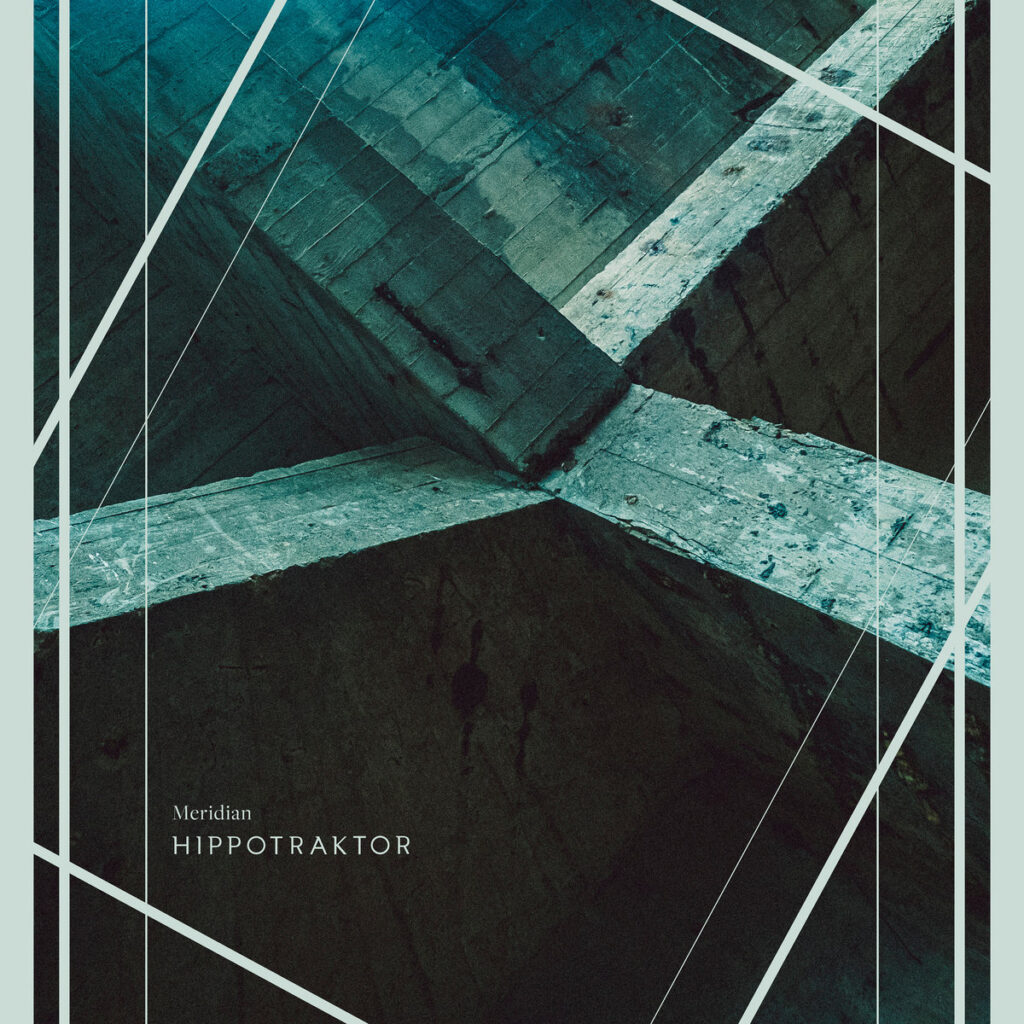
Hippotraktor – Meridian (Belgium)
Style: Post-Metal, Djent (mixed vocals)
Pick by: Sebastian
I was not expecting an album like Meridian to come out last year. This is a pleasant surprise to me as I am a big fan of the modern Belgium post-metal scene, especially for bands labeled under Pelagic Records. To back this sentiment, I would go as far as to say Phanerozoic II was my 2020 album of the year along with Novena, it is a damn near flawless album. Antithetical to usual post/sludge metal, the general sound that comes out of the Pelagic Records material is usually quite polished, well-mastered progressive post-metal. They focus on accessibility, hence allowing for new fans to get into the genre, which is something I can appreciate. This leads us to Hippotraktor, a band that put two heavy things together in their name to show that they mean business.
Reading more into the band’s members I found out that three of them are also members of the acclaimed underground progressive post-metal band: Psychonaut. To be honest, having this constantly in mind might have inflated my expectations of this album to unrealistic proportions as I am quite often comparing the two. However, Hippotraktor does indeed separate itself from its sister band by honing their songwriting down to many short songs rather than the variety we get on Unfold the God Man. This would ideally make the listener more conscious of the riffs and melodies that the album presents.
Oh, did I forget to mention that this band is djent? Yeah, they combine elements of their post-metal roots with very modern-sounding, groovy, down-tuned, high gain riffs. This makes for something that has been done before but is a lot rarer than plain progressive post-metal. We get the djenty palm-muted riffs from the rhythm guitar, over the blaring reverb from their sludge influences, this is along with the lead guitar often playing mathy, staccato chords. This makes for a sound that sounds dark, clean, and industrial; kind of like an urban construction site.
The album art does well to drill this point in, that this is an album about complex, intelligent design, and the modern human world. The theme of this is somewhat new for the band as their two other projects Pothamus and Psychonaut were ones that focused a lot more on Zen Buddhism rather than western theism, and on ancient civilizations rather than modern city-scapes. In my opinion, they can do both pretty well and I appreciate the philosophical implications to their work; it might be a bit nicer if some of the hard-hitting lyrics of this were less screamy and more discernable.
The drum performance on this album is really good and the mix does it a lot of justice. There are plenty of moments where all of the instruments synergize together in a vibey groove and the drums wind up being the most standout instrument. That is not to say that the bass and guitars do not do their job, slowly crushing you like a rolling pin on dough. When the heavy djent parts hit, they hit hard. But I will say, the overall riffs on this album are not as interesting as on Unfold the God Man which was maybe something I was looking forward to seeing from the members of Psychonaut. Additionally, I will say that this album is a lot more straightforward than Unfold the God Man as there are not as many really stand-out experimental sections; with the exception of the mathy, staccato breakdown in the middle of “God is in Slumber” which is my favorite part of the album.
Other than being just a bit disappointing to me, this is a very good progressive post album. I would say this is a good primer for a new fan to get into the other Pelagic Records albums. Or for fans of djent that want to get into more sludge and post metal; I think the modern cleanliness and dynamics of this album would appeal a lot to fans of Periphery, even though this is something entirely different. This is really a sound that one doesn’t come across all too often and I would still recommend this to anyone who is a fan of the bands stated above.
Recommended tracks: God is in the Slumber, Mover of Skies
Recommended for fans of: Uneven Structure, The Ocean, Dvne
You may also like: Psychonaut, Pull Down the Sun, LLNN, Yakuza
Related links: Bandcamp | Spotify | Facebook | Instagram
Final Verdict: 8/10

Wax People – Wax People (US-CA)
Style: Avant-Garde Metal, Prog Metal, Avant-Garde Jazz (instrumental)
Pick by: Dan
Few albums have the balls to truly stand out from the crowd and secure an indelible place on the hierarchy of bands to know, but I’d argue that Wax People have achieved one of the higher spots on my personal list. This unconventional 25-minute EP is not for the faint of heart, but is a delight that doesn’t overstay its welcome, leading the listener through an onslaught of groovy, mathy unison noodles that reward repeated listens and are tight as all fuck.
The riffs don’t frequently repeat, and transitions can become journeys of their own – shapeshifting beasts that never quite reveal themselves, demanding your full, undivided attention. Once in a while, though, things coalesce into repetitive psychedelic hypnosis, leveraging massive dynamics for huge, swaggering payoffs. The balance between these elements is impeccable, and executed with perfect precision. The drumming stays laser focused on the goings-on, such that the eclectic rhythms drive themselves into your subconscious.
This self-titled scratches an itch I didn’t fully understand until I found myself unable to extract its indecipherable hooks from me. I’d been itching for a heavy, woodwinds-focused album, more metal than jazz, that truly connected with me deeply. I’ve finally found it.
Years ago I went to see a tour with Gorguts and Intronaut, and will never forget that the opening three-piece comprised a drummer, a bassist, and a baritone saxophone player. It was a really engaging performance with some exceptionally cool moments, but I found myself struggling to connect fully with their recordings. Something was missing, despite the fact that I so desperately wanted it to work for me – I’m a complete sucker for woodwinds in heavy music.
Wax People, by contrast, is a four-piece: bass, drums, guitar, and bass clarinet. The guitar adds that missing element, distorted and gritty, thickening the mix and adding a bit more depth to the compositions. The guitar and clarinet, in perfect unison, play mind-numbingly complex patterns and streams of notes, joined in a flawless, yet lively synchronization by the rest of the band. The grooves are heavy, and very real – this isn’t quantized to lifelessness – and the songs are fun and engaging. It’s everything I’ve hoped to find from a lineup like this. Not to mention, the cover art by Caroline Harrison is just jaw-dropping. It’s not necessarily everyone’s cup of tea, but do yourself a favor and check it out – it’s at the very least one of the most memorable releases of 2021.
Recommended tracks: All of ‘em, there’s only five
Recommended for fans of: Brain Tentacles, Merkabah, Panzerballett, Trioscapes
You may also like: Papangu, Burial in the Sky, Impure Wilhelmina
Related links: Bandcamp | Spotify | Facebook | Instagram
Final Verdict: 9/10
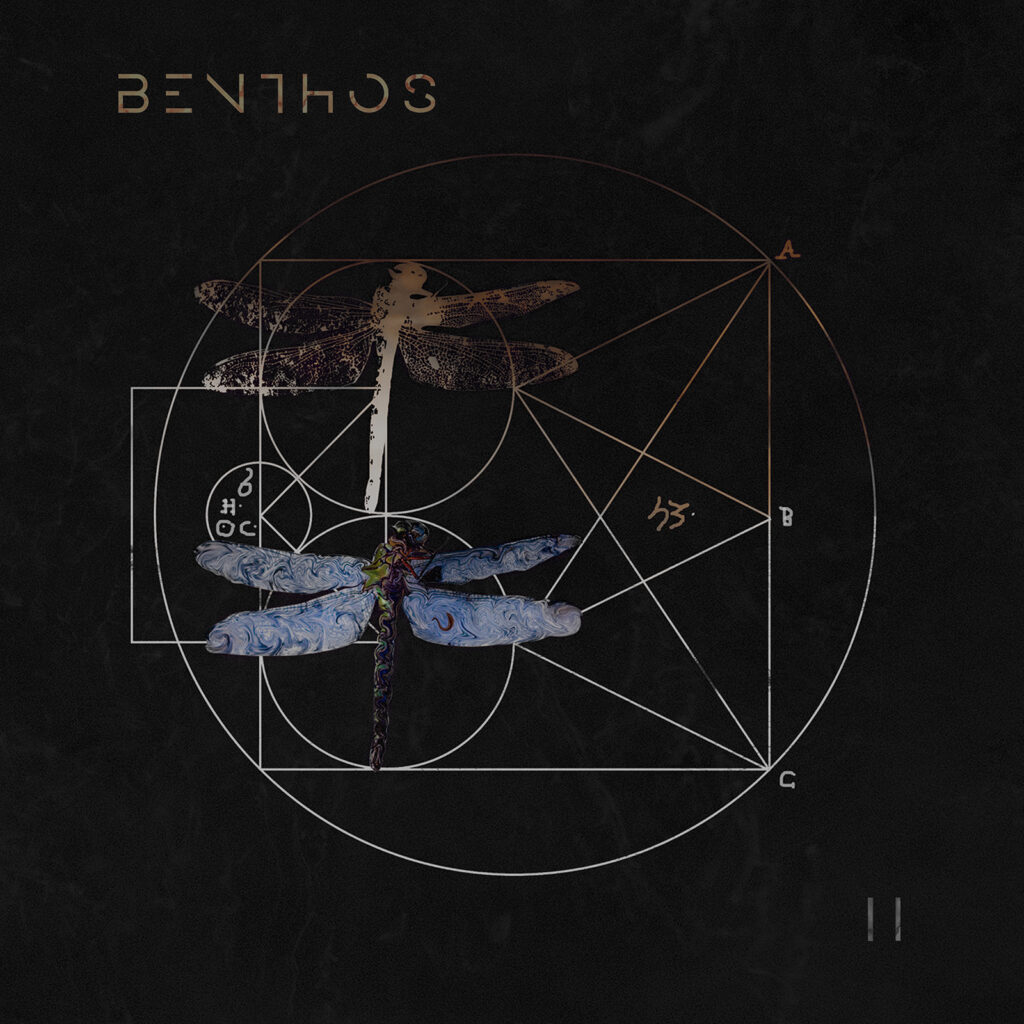
Benthos – II (Italy)
Style: Metalcore, Modern Progressive Metal, Alt Metal (Mixed vocals)
Pick by: Mathis
Benthos is a modern progressive metal band from Milan that combines ethereal song structures with metalcore-esque riffs and harsh vocals to create a unique alternative metal sound. Their new album II doesn’t really sound like anything I have heard before, proggy and experimental, but not so far out there that it is at the end of the spectrum. Not groundbreaking, and not too bizarre, just different. I knew it was good from the start, but I wasn’t hooked. I will break down my experience so that hopefully you don’t have to figure it out as I did.
Before I talk about the songs themselves I think I should address the clean vocals. The vocals instantly stood out to me unlike the rest of the album. I think Gabriele Landillo sings wonderfully with a sort of tenderness that is unique in itself, but what really did it for me was his Italian accent. I know only a few Italian metal bands, and they are all much heavier than Benthos so the vocals here are unlike any others I have heard. Now, on the other hand, the harsh vocals are far less unique and feel bland and basic in comparison.
I briefly mentioned this already, but I knew when I first started listening to this album that it was good. I didn’t even enjoy it much at the time, but objectively it was clear that the songwriting and instrumentation were executed well. It wasn’t until I tried to dissect the music more that I actually was like: “Dang how did I not like this?”. Well, I think I was wanting it to be heavier than it is. I knew II had some heavier parts but it was a chore trying to wait around for them. I wasn’t appreciating the softer parts. “Cartesio” is an amazing opening track, but I was thrown off by the mix of the heavier riffs with gentle vocals, and man there is something mesmerizing about Benthos’ style of writing, and song structure. The vocal lines in “Cartesio” are super catchy, and riffage is the perfect mix of modern djenty styles with a little bit of wackiness.
You may not hear it initially but all the instruments are properly accounted for in the mix too. The bass comes through nicely and compliments the melodic guitar parts. The drums are just all over the place but in a good way. Like, sometimes I think Alessandro Tagliani may have more than just two arms and legs because there are some absolutely nuts drum sections, “Talk To Me, Dragonfly” and “II” are great examples of what mean. The dexterity Allessandro has is awesome, oftentimes you can tell when a drummer is doing ghost notes with their off hand, or that their strong hand is doing most of the work, but the whole first half of “Talk To Me, Dragonfly” sounds like a full-body workout.
I have learned to appreciate this album after about four spins, but there are some aspects that I still don’t love about it. I don’t love the harsh vocals, they are fine, but they are a little bland to me. I think it weakens the music slightly by concealing the complexities underneath. I am not sure exactly what should be done to fix this though, because they do add good contrast to the melodic clean vocals. Another thing I don’t love, is the song “Facing The Deep”; it’s an interlude that disrupts the flow of the album too much. I had to listen to the album in reverse to show the last few songs some love because every time I listen to it normally I stop at the interlude. These two criticisms are not the end of the world but are detrimental to the album to some extent. However, my biggest gripe is in the production, it genuinely rubs me the wrong way. It sounds so washed out to me, if Benthos is trying to paint me a picture then they need to use some more crisp and vibrant colors. There is some sort of flatness to the whole sound of II, and in retrospect, I think this is what took me so long to listen to the music intentionally. The production is so unappealing that I nearly missed out on some excellent content. If you are going to give II a listen, then try to focus on Benthos’ style and musicianship, and do your best to ignore the production.
Recommended tracks: Cartesio, Back and Forth, II
Recommended for fans of: Rishloo, First Signs Of Frost, early Tesseract
You may also like: Claemus, Mile Marker Zero, Moonshine Oversight
Related links: Spotify | Official Website | YouTube | Facebook | Instagram | Twitter
Final Verdict: 7/10
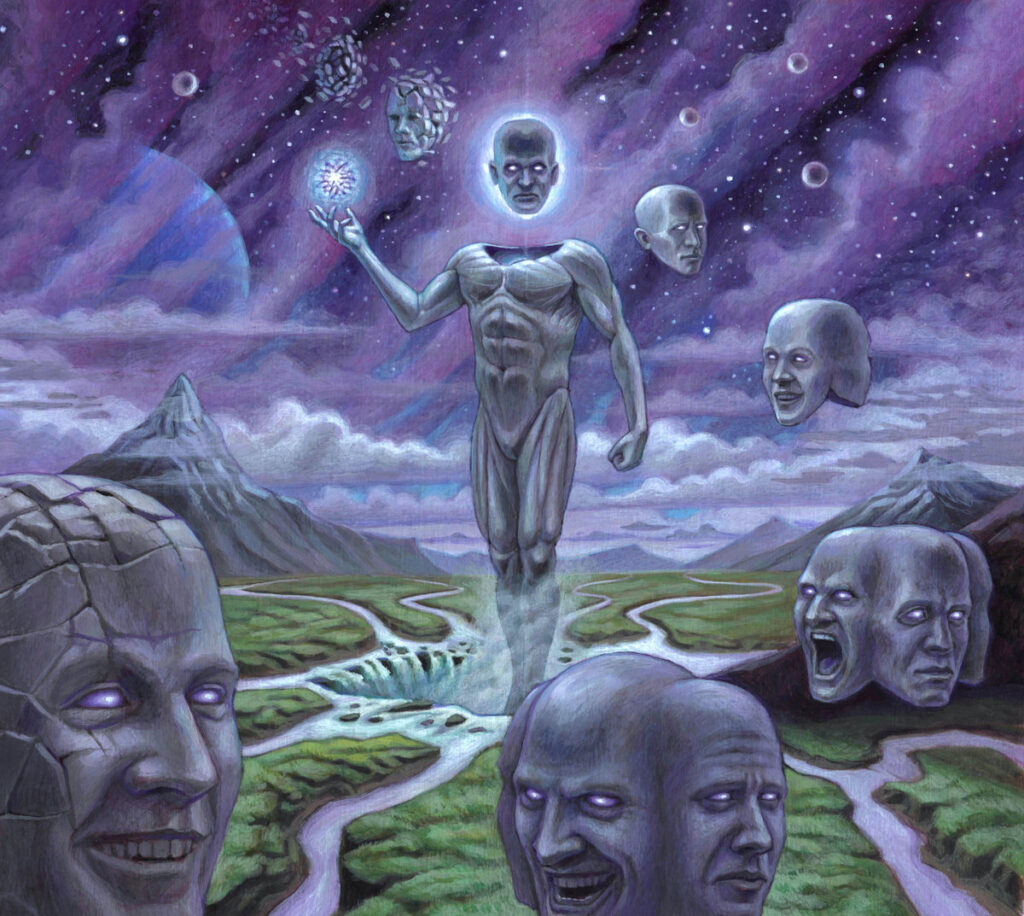
Coevality – Multiple Personalities (US-CA)
Style: Prog Rock, Jazz Fusion, Math Rock (Instrumental)
Pick by: Sebastian
I found this little gem on rateyourmusic by filtering the 2021 prog albums by “Esoteric” and saw that this was pretty highly rated. My intrigue picked up when I read that it featured fretless bass and fretless guitars, and after I read that this was for fans of Cynic I had to listen to it. Since then Multiple Personalities has been in my library and been getting slowly digested throughout 2021. To be honest, I would have reviewed it originally if I hadn’t missed the release date by over a month but it is good enough for me to be diligent on speaking my mind before all of the prog metal “album of the year” content gets released.
After many thorough listens, Coevality continued to exceed my expectations with their lush mix, progressive songwriting, and instrumental creativity. It is even more interesting to note that there really isn’t very much out there like this album. Find me a progressive rock/metal instrumental album with a center-stage, Cynic-esque, fretless bass performance that also has math-rock and jazz fusion influences. This is close to what it would sound like if The Omnific did an album cover of Gordian Knot. It is very hard to pinpoint how much the band weighs into each genre because even though it is primarily prog rock and jazz fusion, it does have noticeable Chon-esque math-rock influences in the melodies and it has an occasional prog metal flair with the guitar solos and the eclectic bass performance.
The whole album is written as one long stream of consciousness and intended to be listened to from one end to the other. Usually, when I hear this, I get a sigh of skepticism because I feel as though a band ideally should make songs that are both digestible in pieces and as a whole. Especially for progressive music, I have seen instances where a band or their fans will make the “stream of consciousness” statement more so as an excuse for a band’s lack of melody. However, I am pleased to say that this is not the case with Coevality. This is akin to how I feel about TV shows; I do not think it is a good sign when someone says “You just have to keep watching, it starts getting good around the third season”. Excuse me? I’m not sitting through a show that long to be impressed. It is up to the show both to impress the audience off the bat to keep them entertained, also to make sure it provides some deeper, thematic, and slow-cooked payoffs later to cement its status as an acclaimed show. This is how I often think of albums, and Multiple Personalities exemplifies this well.
This is because all of the songs have their own flavor of the band’s style but also come together as a cohesive picture. “Light Bikes” and “Oceana” are great starting points to see what the average sound is like. They have intricate melodies, memorable riffs, excellent bass/guitar synergy, and drums that shift from energetic to smooth-jazz. “Coin Incidents” and “Cryptic Creek” offer more of the sweet and melodic side of the band with the inclusion of funk interlude and glistening and atmospheric synths. The album’s climax kind of peaks in the middle; either during “Carnival Minivan” with its zealous trumpets and technical guitar wankery, or “MDP” with its 2-minute bass solo.
I will also say that the album has a kind of duality to it because it has mutual value both as conscious, complicated music and as passive background music. When doing focused analytical listening, there is a lot of complexity in the layers of guitar riffs, bass soloing, and smooth jazzy percussion to appreciate. But on the flipside, this is a great album to put on in the background and help the brain flow to get you focused on another task at hand; this is in part due to how well this is mastered and mixed. Whoever did the technical aspect of this album’s sound really played into its strengths by enhancing the bass in the mix to be in the forefront but also softening it up so that it’s sweet, not overbearing. The guitar and drums are also vibrant and clearly audible as well.
Overall, I think this is a great example of what progressive jazz fusion rock can bring us without relying on a saxophone or other jazzy woodwind instruments. Oftentimes bands in the genre use it to sound more “jazzy” but Coevality does an excellent job with the three instruments they use. If you like progressive instrumental stuff, you should check this one out, pronto.
Recommended tracks: Light Bikes, Oceana, MPD, Coin Incidents
Recommended for fans of: Cynic, The Omnific, Chon
You may also like: Gordian Knot, Thrailkill, Nova Collective
Related links: Bandcamp | Spotify | Official Website | YouTube | Facebook | Instagram
Final Verdict: 8/10
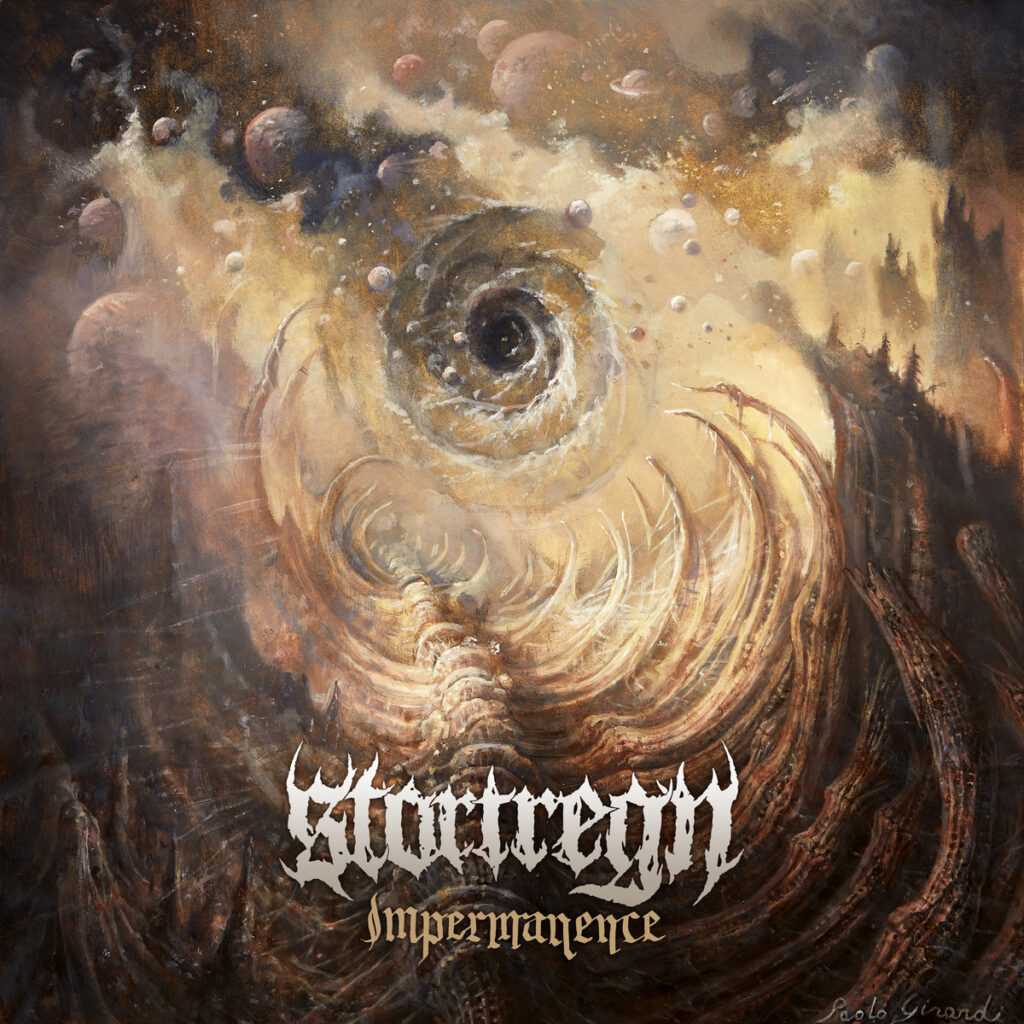
Stortregn – Impermanence (Switzerland)
Style: Melodic Black Metal, Technical Death Metal (harsh vocals)
Pick by: Zach
Oh, the days when you just start diving right into subgenres. You shop around for a month or so, figure out what you do and don’t like, and discard the rest because your subgenre is superior to everyone else’s. What did I like, you may ask? Well, I like it when the guitar do the weedly weedly and the drum do the RATATATATA and the bass can be heard. But in all seriousness, I love a bit of unconventional instrumentation. If that wasn’t obvious enough from my love of UneXpect, that is. Sure, I love it when it’s a complete gimmick and I know it adds nothing to the song. But when it’s really there to stay on the whole album, adding flavor and character to each song, well, that’s fucking great.
Sure, I like being dropped headfirst straight into a pummeling riff to start an album off. Who doesn’t? But you know what I love even more? Being eased into an album. A song that builds upon something simple and releases into a fist bumping moment of pure sonic bliss. Unconventional instrumentation in the mix doesn’t hurt either. Yeah, I’m talking about the opener to Stortregn’s Impermanence.
What an opener! “Ghosts of the Past” kicks this album off in style with an incredible lead motif and enough blast beats to please my ear canals. The way this song seamlessly shifts between sections tells you everything you need to know about Stortregn right off the bat. They mean business, they’re ridiculously talented, and their music will be stuck in your head for weeks. I caught myself whisper-screaming “ASHES TO ASHES, DUST TO DUST” more than I care to admit after a mere two listens.
Speaking of seamless, the transitions on this album are downright incredible. “Moon, Sun, Stars” starts in a fairly similar fashion to the previous track, but everything sounds…wrong. More sinister. The fingerstyle acoustics are minor-keyed and the leads sound far gloomier this time around. A much faster track with a less epic feeling that gives those longer tracks so much more substance, it does its job astoundingly well.
Stortregn know how to start a song with momentum and keep it going. Everything on this album is Inferi-speed with plenty of acoustic interludes to shake things up. But what I find so interesting about Impermeance’s acoustic sections versus any other bands is that they’re so well interspersed with the Dissection-tremolo riffs and tech-death chugs that it doesn’t even feel like the song is calming down. It feels like a natural buildup to whatever godly riff comes next.
“Grand Nexion Abyss” is the standout of this album to me. Combining everything I loved from the first section of the album, it’s the perfect way to drop the listener back in after the instrumental breather track, ‘Impermanence’. Some might say that the structure feels a bit samey by now. Chuggy riff switching into acoustic section into a very long scream over tremolo over blast beats. But god damn if it doesn’t work so well. And Stortregn has enough riffs and tappy goodness that keep everything from sounding the same on each song.
But as amazing as every track on this album is, Impermanence is the greater sum of its parts. Yes, the songs are still amazing on their own, but they flow so immaculately well together and each song has such a strong opener that you are almost forced to listen to it as a whole. Everything building up to the opening scream on “Neine” and the breakneck finish that song has makes it so much sweeter. Of course, what would this album be without ending on a classical guitar interlude? Because we gotta go out with that same unconventional instrumentation that brought us in.
Recommended tracks: Ghost of the Past, Cosmos Eater, Multilayered Chaos. The entire album flows like one long song, so I’d suggest just listening all the way through.
Recommended for fans of: Interi, Obscura, Dissection, Mors Principium Est
You may also like: Singularity, Proliferation
Related links: Bandcamp | Spotify | Official Website | YouTube | Facebook | Instagram | Twitter | Metal-Archives page
Final Verdict: 8.5/10
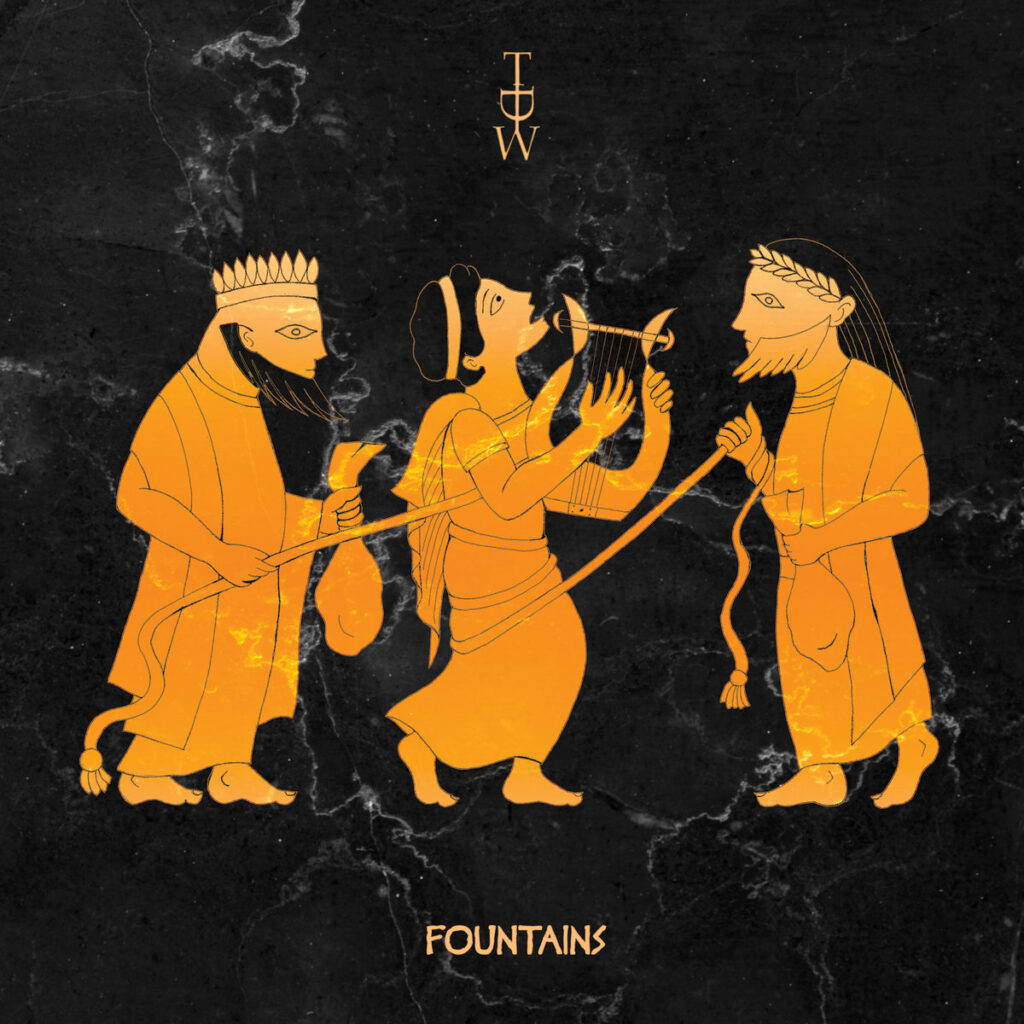
TDW – Fountains (The Netherlands)
Style: Symphonic Prog Metal (mixed vocals)
Pick by: Sam
Once upon a time, we covered a Dutch symphonic prog metal band on this blog called Dreamwalkers Inc. They caught my attention for the fact that they had five fucking vocalists listed as full-time band members (and I guess also the music was pretty good). It was only later that I learned that the project was actually the brainchild of just one fellow Dutchman by the name of Tom de Wit, and that the record in question – First Re-Draft – was not just the first, but the second reimagining of his debut solo album First Draft (should have called it Second Re-Draft SMH my head). By the time I learned of the existence of his solo project TDW, it was already too late to cover his latest outing The Day the Clock Stopped (research is not my strong suit, as you can tell). But luckily for me, there was an upcoming album I could cover in Fountains. I asked the man for a promo, and two months later… here we are. Yeah. I should apologize for how late this review came out. I got a major writing burn-out, and this was an unfortunate casualty of that.
On the bright side though, the lateness of this review gave me the time to listen to his entire discography before I heard this. It was a fun, albeit inconsistent experience. He has a very peculiar style of symphonic arrangements, that for unknown reasons, feel very Dutch to me (maybe it’s the cheese?). I wouldn’t be able to tell you anything about the details, but they were always vibrant and had plenty of variety. The songwriting fluctuated pretty heavily between mind-blowing brilliance and clunky filler parts. And for the life of him, the man could not trim his albums, which were often a solid twenty minutes longer than they needed to be, if not more (looking at you, Scrapbook). The early albums also suffered heavily from basement production and a god-awful drum machine. Overall though, his sense of melody and composition made it mostly a pleasure to sit through. And lucky for me, Fountains has a very manageable length of 56 minutes, so it looks like we have another win on our hands!
For a large part, I indeed see Fountains as a win. There are a couple of excellent cuts on the disc. The first two songs in particular are great, rather straightforward tracks that show you what the record is all about. Nifty synth lines, large symphonic backing, hard riffs, lots of tempo changes, and a full fucking choir backing Tom’s largely soaring vocals. There’s even a couple of harsh vocal parts. It has a general chaotic element that is just strong enough to keep you on your toes, but weak enough not to make it feel like he’s throwing everything at the wall to see what sticks. Another strong cut in this regard is the hilariously whacky upbeat rocker “Graveyard Boogey” in the back half of the album, which shifts between over the top dramatism and circus sounds over a hyperactive drumbeat at the drop of hat. On the more introverted side, there’s mostly laid back passages here and there, but “Anthracite” stands out as a very moving power ballad. It slowly climbs out of ominous electronics with whispered call and response vocals into blast beats and growls to an eventual full choir reprise of the main melody, giving a satisfying payoff to all the build-up. “Hope Song I” is also a great, moving breather track, albeit it functions more like an interlude. Its sequel is the epic closing of the album. It’s easily the most symphonic song on the record and gives it a good finale. I also definitely recommend listening to both “Hope Songs” in a row as a bonus because it’s a treat.
There’s a couple of aspects about Fountains that I found hard to connect to – things which also appeared in Tom’s previous work. Maybe it’s solely my cringing at a fellow native’s accent, but in a lot of the aggressive, powerful moments Tom’s delivery sounds rather stiff (or “wooden” as we Dutchies like to say), and I find myself more appreciating the emotion he’s trying to convey rather than his singing actually makes me feel said emotion. In short, the cheese is too strong. His softer parts were very moving, but it seemed like the more power he put in, the less I connected to it. I was also iffy on some of the slower riffs, which sounded clunky, and some of the lyrics were blunt to a fault and took me out of it (“If I shout louder than you, does that make me right?”). (Damn I really am just roasting my own country here aren’t I? FFS)
On the whole, I liked Fountains. There are certain aspects I didn’t like as much, and some songs were stronger than others, but the overall experience was thoroughly enjoyable. If anything, TDW has an unmistakable character in terms of writing and production, and that’s worth a lot. If you enjoy what you hear in this album, definitely explore the rest of his discography (and Dreamwalkers Inc!) as well. It’s a lot of fun.
Recommended tracks: Inner Energy, Anthracite, Graveyard Boogey
Recommended for fans of: Ayreon, Epica, Dream Theater
You may also like: Dreamwalkers Inc, Sentire, Royal Hunt
Related links: Bandcamp | Spotify | Official Website | YouTube | Facebook | Instagram | Twitter | Metal-Archives page
Final Verdict: 6/10

Sound Struggle – The Bridge (US-NY)
Style: Jazz Fusion, Djent, Progressive Metalcore (Mixed vocals)
Pick by: Mathis
Is your prog too boring? Are you sick of all of the new albums that are “For Fans Of” Periphery, Haken, Dream Theater, Tool, Caligula’s Horse, etc.? What you need is something fresh and fun; something that will whiten your teeth, improve your posture, make you successful, burn that pesky fat in six months or less, and replace the need to ever wring your mop out ever again! Sound Struggle may have the perfect album for you! The Bridge can’t do any of that fancy stuff I just listed, but it sure is fresh, and it sure is fun!
Sound Struggle is the brainchild of Cameron Rasmussen, but the project is way more than just him. He is sort of like the ringleader. I counted around fifteen other musicians that played a part in making this album, and I am confident that there were plenty of other folks that aided in the production of The Bridge as well. The Bridge is a concept album about a young man that journeys to find his mother who left him as a child. He eventually finds her and learns that she is part of a religious organization, naturally he, joins her, only to find out later that he has joined a corrupt group of cultists. It is a pretty cool story, but honestly, you don’t need to follow it at all to enjoy the album. This album is just a bundle of fun, but be warned it is hecking long. I guess Cameron had been writing since the last Sound Struggle album which came out six years ago, so he had an insane amount of content ready for release, and to add on top of that Cameron has announced that Sound Struggle has been officially disbanded. The album is long because he wanted to release everything he had written and end it with a bang, he isn’t doing it for the precious prog points.
Congrats on making it through the little history lesson, now it’s time for recess baby! The Bridge is a jazzy, djenty, oddities a plenty album. After the intro track, you are launched into the thick of it with “Foresight”, one of my favorite tracks on the album with a catchy chorus and blaring horns. It djents too, but that falls by the wayside because your brain just loves to focus on that staccato trumpet blast with the crescendo right after, or maybe you get caught up in the noodly lead guitar. There is an immense amount of depth to almost every one of the eighteen songs on this album, so much so that it will take more than just a few listens to fully grasp what is happening at any given point.
If you are a fan of Arch Echo you may have noticed something sounds familiar here, and this is no coincidence! Four of the five members of Arch Echo are ex-Sound Struggle members, but more than that, the reason for the similarities is because all of the bass guitar in The Bridge is performed by Arch Echo’s bassist Joe Calderone. It doesn’t stop there though. Adom Rafowitz and Joey Izzo are both featured multiple times in the album, these two are the masters of melody in Arch Echo. Adam is a genius guitarist, and Joey shreds his keyboard just as masterfully. This whole album is like the buffer, scarier, and darker elder sibling of Arch Echo, and it is amazing. Older bro also happens to have a thing for brass and woodwind instruments, which makes this album so unlike any other boring concept album.
There are way too many songs to cover, but here is a little overview of what you might find scattered throughout The Bridge. Lots and lots of amazing guitar solos, a guitar, and a trumpet taking turns serenading each other (“Decisions”), surprise vocals on what you thought was an instrumental track, a beautiful string quartet intro, rapping, a stanky bass clarinet riff, a sad soft song, a happy soft song, a saxophone solo, and much more!
The Bridge was one of my favorite releases of 2021, but boy howdy is it long. An hour and fifty four minutes to be exact, and it is split into two discs so that may help some listeners but the bottom line is that it is an insane amount of time to listen to such involved music. I only have one other issue and that is that on occasion the clean vocals sound a bit incapable, specifically when trying to reach higher notes. I don’t think the vocalist specializes in this style of music, but he does very well with the few softer songs on the album. Despite these shortcomings, I think the album is nothing short of remarkable, I just wish it could help me burn off some excess fat.
Recommended tracks: Foresight, Decisions, Vogel, Try To Fly
Recommended for fans of: Arch Echo, BTBAM
You may also like: Rototypical, Step In Fluid, Electrocution 250
Related links: Bandcamp | Spotify | YouTube | Facebook | Instagram | Twitter
Final Verdict: 8/10
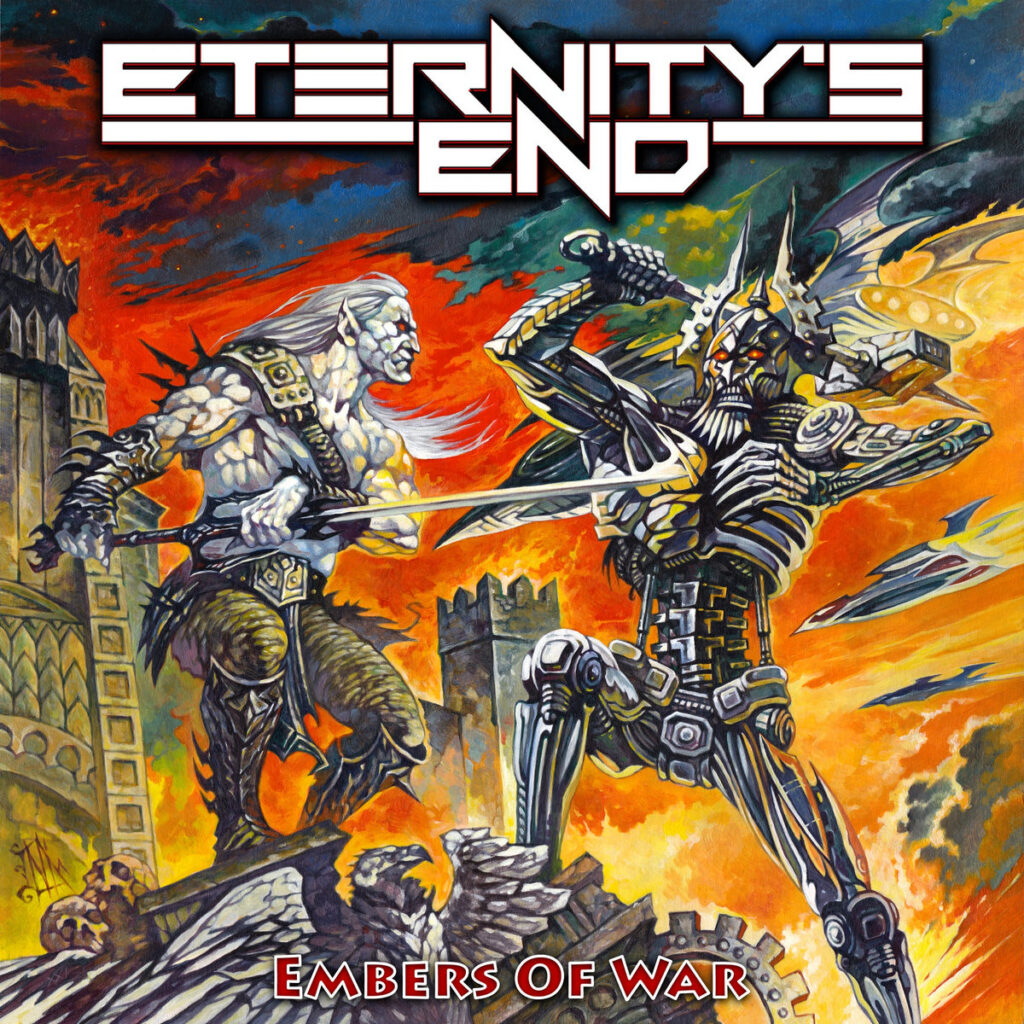
Eternity’s End – Embers of War (Germany)
Style: Power Metal, Neoclassical Metal (clean vocals)
Pick by: Sebastian
Eternity’s End is a band I’ve heard a good bit about before November when they released their 3rd studio album Embers of War, which was around when I started listening to them. As you may know, in this area of prog and neoclassical metal, there are some keywords that get thrown around a lot; “technical”, “blazing”, “hypersonic”, “shred-tastic”, etc. Especially for prog metal reviewers, to be constantly covering bands of impressive technical chops, it is easy to become desensitized and grow a tolerance for musicians’ audible skill in music. This is why it is all the more noteworthy that I was pretty much aghast by the level of technical ability that these guys have. To put it another way, this band has reached a level of mechanical skill that very few musicians will ever reach; I’m talking the top one percent of the top one percent of musicians, essentially the billionaire class of mechanical skill. And it goes without saying that this is the most technical band I’ve reviewed.
Looking more into the relevant details of this band’s history, one will find out that Eternity’s End was founded by three ex-members of Obscura: Hannes Grossman, Christian Münzner, and Linus Klausenitzer. Ahh, hah! The world makes sense now. I have thought on a couple of occasions that this is Obscura-level musicianship, especially in the sweeping guitar solos, occasional grinding bass solos, and even in their compact songwriting style. What pleases me, even more, is that their history shows a brief but impressive discography and a clear accelerating trajectory in the quality of their work, with each album better than the last.
I’m not even sure what the lyrical content of this album is about but I assume it is about fantasy or, in other words, stereotypical power metal stuff. From the gorgeously illustrated album cover, it seems an albino orc is battling a robot Viking-looking fellow in the courtyard of an industrial castle with airships, explosions, and a flame-ridden sky. So yeah, pretty much stereotypical power metal stuff. I like to think all of this going on in the album cover exemplifies the sheer dense action going on in the musical compositions.
What you will get from this is essentially a ton of neoclassical, almost speed-metal, guitar shred after guitar shred. Essentially, every guitar in this is shredding, almost as though every instrument is on its own mission to grind up the listener and destroy everything in its path. I also love the occasional post-Cynic type of bass solo only comparable to what one would hear from Obscura albums. Hannes Grossman is an extremely celebrated metal drummer for a reason, hit fills are relentless and are mixed to have a deep impact on the compositions. The lead vocals are the only thing I was not too fond of at the beginning but they have some time to shine. For example, Iuri Sanson shows off his high range well and brings in a melodic chorus amongst the instrumental onslaught in “Hounds of Tindalos”. However, his voice can sound overly strained and often comes out sounding like he needs to drink some water. The situation of this band really takes me back to the following Dream Theater meme.
What is also cool about this album is that because the musicians have non-power-metal backgrounds, they provide a somewhat aesthetically different album than what it might have sounded like without their history in technical death metal. In Embers of War, one might be able to hear Symphony X, Blind Guardian, Lost Horizon, or Yngwie Malmsteen influences but there is a kind of brutally ruthless undertone to it all. This may, of course, just be my mental projection into the album, retrospectively, knowing they came from tech death. But I genuinely hear this, god damn it! However, I do not hear this so vividly that it makes me believe the band made a groundbreaking innovation to what defines power metal. In other words, I review albums in a way where about one-fifth of the overall score is determined by how much I feel the band made something unique, creative, unconventional, and original; something that cannot be easily traced to its component influences. This album generally has very few flaws but the way they conform to technical power metal tropes is their most vivacious weakness. This is an album that pushes new grounds in terms of mechanical boundaries, rather than in terms of creative boundaries.
Recommended tracks: Arcturus Prime, Embers of War, Call of the Valkyries, Hounds of Tindalos
Recommended for fans of: Christian Muenzer, Lost Horizon, Symphony X, Helloween
You May Also Like: Forever’s Edge, Opus V, Parallel Dimension, Starbynary
Related links: Bandcamp | Spotify | Official Website | YouTube | Facebook | Instagram | Metal-Archives page
Final Verdict: 9/10

Acolyte – Entropy (Australia)
Style: Symphonic Prog Rock/Metal (clean, female vocals)
Pick by: Sam
Can anybody tell the people in Australia to calm down already? The heat that comes from that country is insane. The amount of quality, forward-thinking heavier prog acts that have come out of there in the last fifteen year is ludicrous. From Caligula’s Horse to Ne Obliviscaris to Karnivool to Be’lakor and back, those people gotta chill. They probably can’t with the temperature over there, but still. Acolyte here is the latest wonder-band to bring us the heat from down-under. This time with some wonderful symphonic prog rock.
OK sorry I lied. This album may be prog rock but really it’s prog power in disguise. The synth choices and riff types they go for would fit right in on a power metal album. If they put in just a little more double bass and fast paced riffage it’d 100% be a power metal band. As a power metal fan I found this a little disappointing, but it works to the band’s advantage overall. Entropy has all the emotive strength and anthemic quality of the genre, but does not take any of the cheese that frequently deters people. Morgan-Leigh Brown delivers a very smooth, emotional performance, and the darker synth patches help create a moodier atmosphere. I do miss some of the more intricate riffing patterns though. Often when they do go into riff mode it’s just simple strumming patterns or arena rock type open chord riffs, which compared to the quality of the rest of the music leaves me wanting more.
The songwriting of this band otherwise is just fantastic. They’re masters of tension and release. Symphonic metal is not something I generally associate with long build-ups but this band makes them work magnificently. Take the climax of the title track for example. They start with a simple, but tense groove and slowly let the keys start swelling, rhythmic vocals come in and everything just keeps getting more and more intense until it just explodes. It’s one of the best things I’ve heard all year. In general, the song also illustrates well how the band isn’t afraid to venture off the conventional songwriting path. At first it sounds like a typical verse-chorus type prog song but after the second chorus it goes off in this beautiful atmospheric part with multiple climaxes and the chorus doesn’t come back at all. “Resentment” is the only track that takes the more typical route as it goes for the straightforward rocker approach. All the other short songs are atmospheric interludes (and yes, that includes the five-minute long “Recovery”).
This means that merely half of the songs on this album count as actual songs. The interludes are all beautiful in their own right, but part of me wonders about their necessity given that all the long tracks have more than enough loud-soft dynamics to keep the album paced well. For example, the opening interlude always gives me extra time to reconsider whether I am committed to listen to this album and not something else, while if it started immediately with the riffs of the title track I’m less inclined to think twice about it. And between “Idiosyncrasy” and “Acceptance” there are two interludes combining for a total of seven (!) minutes. It’s not that they’re bad, but pacing-wise it becomes a bit tiring. Effectively there are three epics in a row, all of which are slow burners that start soft and end epic. I could have done with a more immediate, faster paced track there to spice things up (this is the part where I wish they were actually power metal sometimes).
In the end though these things are hardly deterrents. The album always flies by when I listen to it. The peaks this band achieves are among the best you’ll hear in prog metal. And I didn’t even get into the gorgeous production job they had which – given the fact that they brought in some award-winning producers – shouldn’t come as a surprise, or the wonderful Middle-Eastern inspirations in “Idiosyncrasy”. Entropy is among the best things I’ve heard all year, and you’d be a fool not to listen to it if you have any love for clean vocals prog. Australia has done it once again and delivered something fantastic.
Recommended tracks: Entropy, Idiosyncrasy, Acceptance
Recommended for fans of: Cellar Darling, The Great Discord
You May Also Like: Venus in Fear, Lost in Thought, Tanagra, Dakesis
Related links: Bandcamp | Spotify | YouTube | Facebook | Instagram | Twitter
Final Verdict: 8/10
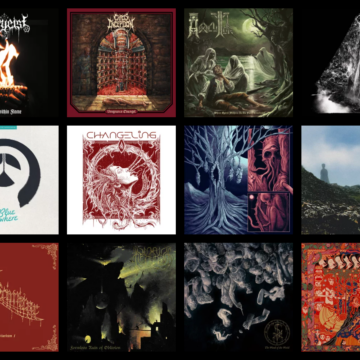
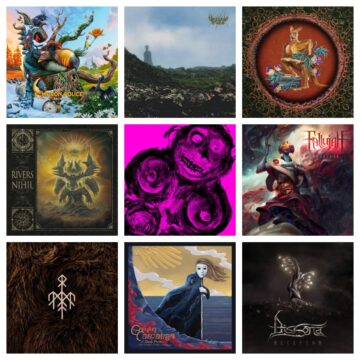
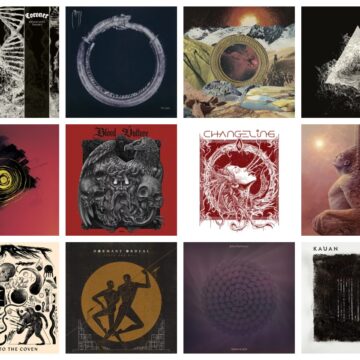
1 Comment
fictionfuture · January 27, 2022 at 23:43
A+ report. Whack prog metal is one of my favorite genres now.